#That's pretty much always how it is for me like any metaphors/other symbolic structures I set out with INTENTIONALLY usually end up being
Explore tagged Tumblr posts
Text
Writing and suddenly realizing I have unwittingly established a coherent metaphor that ties several plotlines together thematically COMPLETELY by accident

#That's pretty much always how it is for me like any metaphors/other symbolic structures I set out with INTENTIONALLY usually end up being#shitty or irrelevant meanwhile stuff that just manifests on its own is actually coherent and solid#It's awesome. Love to share someday if I were not terminally self-conscious about writing#I think I'm like.... technically competent (not great but not bad) and maybe notably decent at being funny but any time I have to share#anything publicly it's like DON'T FUCKING LOOK AT ME!!!!!!!!!!!!!!!!!!!!!!!!!!!!!#Creative writing classes were hell for me#I did share some stuff here on my prev account but it was straight up bad I'm better now
15 notes
·
View notes
Note
okay so regarding the Great Quiet Thing. I was reading through your big post to get caught up on all the Saint stuff (I was around for Curse but played very little, wasn't around for Dawn) and when you got to the Sundial section it clicked for me - I agree it's pretty clear that there's nothing to do with Ahamkara, but I'm not so sure that Worm Gods can be dismissed so easily - as I understand it there are quite a few that we know of but don't know anything about, right? And Xol was able to do... something with the Vex structures on Io? Not sure about the details there but the idea of Worm God + Vex isn't entirely out of nowhere, right? Absolutely no evidence or detailed thought about it but my gut guess is that 1) the sundial core is related to a Worm God if not literally one of them (maybe it's serving a similar role as the worm larvae do in their pact with the hive, feeding Light to its parent worm?) and 2) the Not-Worm in the Vexnet is related to/is that same worm tied to the sundial (or it's just. an echo of Xol or something). Osiris did say after all that his Echoes were more appropriate for Taken Kings, right? He could've chosen any metaphor to say "yeah they're a darkness-based ability" but he went for that.
I thought the same thing, exactly because I mentioned the Worm Gods in that post as an option as well. And the moment I read that in the lore page I was like. Are they going with that then? Because that would definitely fit with what we know about the Sundial core. I'm still not sure if that really needs explaining, but they've mentioned the Sundial again this week and in a very... concerning way.
The Conductor claims, had Osiris not created the Sundial, had I remained forgotten, Sagira would live still. How could these things be connected?
Huh? How indeed. Why would they tell us this?
I always thought that there might be some symbolic "life for a life" cost of the Sundial that somehow related to Sagira's fate, but them bringing it up in this way is... strange. The Conductor could always just be saying this to upset Saint ofc and there doesn't need to be anything truthful about it, but. I am considering it.
The name of it being specifically "Not-Worm" bothers me though because it's almost too on the nose about it not being a worm. Sounds like something a worm would say. But maybe it is just what it says on the tin. The other name also makes me think. "The Great Quiet Thing" reminds me very much of Osiris' way of describing the Lunar Pyramid as: "The Great Angular Thing."
Osiris was no stranger to Hive shenanigans so him somehow having some Worm God parts would not be extraordinary. He literally had a fang of Xivu Arath. Whispering and eating the Light and coming in with some dark bargain all fits here. And if the Conductor isn't lying about the link to Sagira, well, Sagira ultimately died because of the Hive.
This might be some stuff that gets cleared up next week, or it could potentially be the related to Act 3 or more specifically to the exotic mission coming in Act 3.
It might also be entirely unconnected and it's a setup for something going forward, possibly the other two incoming episodes. Some unknown entity lurking in the Vex Network, pretending not to be there and saying it's "too soon" seems like it's possibly just a hint for something later.
But of course, I am going unhinged by the minute. They keep dropping details that are like a few sentences that send me spiralling into madness every few days.
I'm definitely thinking about it.
23 notes
·
View notes
Note
I think something that doesn't get discussed in the Jonsa fandom is how Arya would react to it ? I can certainly see her feeling excluded initially considering the one with whom she shared the strongest bond with, has developed a different kind of relationship with her sister(Sansa). All of them were raised as siblings and we know Jon and Sansa were the most distant but how would Bran and Arya process the whole dynamic between those 2 ( Jon & Sansa) ?
combined with another ask:
How do you think Arya would react to when Jon and Sansa fall in love? The reaction of the other Starklings to this pairing always interests me . Any thoughts especially about Arya ?
Hi anon(s)!
That is a great question. Honestly, I doubt Bran or Rickon would struggle much with it. Bran is open-minded to begin with and has spent every day since the first book expanding upon that in order to accept situations and information that range from uncomfortable to devastating. Any kind of development that involves happiness rather than horrible loss is going to be a win in his eyes. Rickon is likely too young to care either way. He was three years old the last time he saw either of them and might mistake them both for his parents at first glance for all we know.
Arya is the really interesting case, and she would probably struggle with this. It’s suggested that she will. Her first conversation with Sansa revolves around Jon:
Sansa had the grace to blush. She blushed prettily. She did everything prettily, Arya thought with dull resentment. "Beth, you shouldn't make up stories," Sansa corrected the younger girl, gently stroking her hair to take the harshness out of her words. She looked at Arya. "What did you think of Prince Joff, sister? He's very gallant, don't you think?"
"Jon says he looks like a girl," Arya said.
Sansa sighed as she stitched. "Poor Jon," she said. "He gets jealous because he's a bastard."
"He's our brother," Arya said, much too loudly. Her voice cut through the afternoon quiet of the tower room.
Septa Mordane raised her eyes. She had a bony face, sharp eyes, and a thin lipless mouth made for frowning. It was frowning now. "What are you talking about, children?"
"Our half brother," Sansa corrected, soft and precise.
Anvilicious.
The chapter revolves around their shared needlework imagery, which is taken up seamlessly (heh, pun) when Arya escapes the sewing circle to talk to Jon about how unfair everything is and how the woman is important, too.
"Look at the arms on his surcoat," Jon suggested.
Arya looked. An ornate shield had been embroidered on the prince's padded surcoat. No doubt the needlework was exquisite. The arms were divided down the middle; on one side was the crowned stag of the royal House, on the other the lion of Lannister.
"The Lannisters are proud," Jon observed. "You'd think the royal sigil would be sufficient, but no. He makes his mother's House equal in honor to the king's."
RLJ foreshadowing and Targ-rejection foreshadowing and marrying into a powerful woman’s House foreshadowing all wrapped up in needlework described identical to Sansa’s: exquisite. The show believably suggests Sansa will give Jon an exquisitely crafted garment with heavily symbolic arms, too. All embedded in a conversation between Jon and Arya.
Since the needlework metaphor draws through the length of the first book, is hammered home in Jon giving Arya her sword Needle, and culminates in Arya’s promise to make Sansa a new betrothal dress, after she ruins the first, we’re talking about a pretty sustained thematic connection between Sansa, Arya, Jon - and marriage.
Considering the way it is structured in the chapter and in the first book, I suspect Sansa’s relationship with Jon will be a point of contention discussed between all of them separately. It will be a cause of conflict between the sisters, and between Arya and Jon, it involve the revelation of Jon’s true parentage and involve Arya’s active participation in making the marriage happen, likely because it will make Jon and Sansa happy, and at the end of the day Arya will simply love both of them more than whatever traces of resentment or insecurity that may remain.
Jon is very much her heroic big brother, her mentor (Stick’em with the pointy end.), her touchstone and her most comforting idea of home. She would not even tell Ned that Jon gave her Needle. Conflict between them, and a certain empancipation, a willingness to accept something discomfitting and “share” him while still feeling secure of his love, would be a stepping stone toward growing up that is not rooted in loss and instability but in a growing emotional independence, a certainty of herself that no longer requires Jon and Jon alone to be her safety net. She would still have Jon, and have Sansa, too.
ETA: OMG. This is probably how "Don't... tell... Sansa!" will come back, too. And secret dancing lessons. Secrecy and draaamaaa.
66 notes
·
View notes
Text
Lana Del Rey Album Songs Ranking (Remade)
It’s been a few years since I ranked all of Lana’s (album) songs so I wanted to do it again. This is all my OPINION, which I’m sure some people might disagree with, but you don’t have to agree with it. This is also a very long post.
Don’t Let Me Be Misunderstood
This cover song is just a little too drab and uninteresting to me, and I never listen to it. After the brilliant, sprawling, sexy, heart-breaking tracks on Honeymoon, this feels like a tacked-on track just to plump up the album. It feels simply like a cover.
For Free
Though this is a well-made song, with three brilliant women owning the track, it again just feels like a cover. It fits in well with Chemtrails, but by the time I get to this song I’ve had my fill.
Breaking Up Slowly
It just feels repetitive and simple, something only to have on in the background while my attention is diverted. It’s a good song and a nice attempt at bringing Lana’s country music in, but it does little to keep me interested.
God Knows I Tried
This song is filler. Jammed between the jazzy softness of Terrence Loves You and the pop favourite High By The Beach, this track just feels like it was sort of shoved in. It doesn’t even feel completely right on Honeymoon, instead a throwaway song that bridges Ultraviolence and Honeymoon whilst not fitting in with either album.
24
Though perfect for the credits of a Hollywood movie, 24 has plenty of flair but nothing of substance. The lyrics aren’t as imaginative as most of Lana’s music and I’m not surprised this song found itself near the end of the album.
Lucky Ones
Personally, this song irritates me. It's sickly in its lyrics, sugary in the romance and classic Lana tropes of dangerous men and Lana starstruck by them no matter if they’re ‘careless cons and crazy liars’. The little flair of the verses and the overtly sweet chorus really irks me, especially following the brilliance that is Lana’s first ‘Del Rey’ album.
Coachella
It is a rushed track, sounding completely unfinished and hurried with an unconvincing track beat. Polished, it would be brilliant – but it sounds like Lana thought of the song (which sounds promising in the video where she sits in the forest and sings) and had to force it to ‘fit in’ with the trap-pop tracks on Lust For Life. The lyrics are thoughtful, if not cliché, but it could have been done better.
This Is What Makes Us Girls
It just doesn’t appeal to me. Maybe because I can’t connect to the lyrics in any way, I just don’t feel anything when I hear this song and choose to skip it. That being said, the demos are pretty fun.
God Bless America
As much as it’s a song honouring women during a period of time when feminism was being shaken, it doesn’t quite feel like Lana’s heart is in it. The patriotism is uneasy considering she was removing herself from the American flag and its associations, and the anthemic feel never lifts. It’s a sweet song, but never goes deeper than surface level.
Religion
Though fairly sexy and haunting – her unshaken faith to her man, her drawling voice – this delicate track is too simple and sombre for me to get completely into it. I always want to skip and get to my favourites.
In My Feelings
It’s great Lana has a bad-girl, bad-bitch, fuck-you pop track but this, like Coachella, feels unfinished. It has the vibe of work in progress, and the vocals are still messy (surely intentionally, though it doesn’t always come across that way) as well as trying slightly too hard. It doesn’t compare to Fucked My Way Up To The Top.
Beautiful People Beautiful Problems
The verses don’t match up to the choruses and I feel nothing – not empowered or emotional – when listening to this song, but it is a beautiful duet between Lana and Stevie. Their voices really are divine together and though I don’t listen to this song much, the demos are even better.
Change
Mostly because it freaks me out, this is a song I don’t often listen to. With a basic structure yet long, meandering lyrics, Lana broods over the state of America at the time, which can make for depressive listening. Though it’s a pretty enough song, it’s seriousness is too much to bear sometimes.
Blue Velvet
Sometimes too slow, Blue Velvet doesn’t inspire multiple listens in me, but it is a gorgeous cover and absolutely a showcase of Lana’s vocals.
Diet Mountain Dew
A cheeky little track that won many over, it still is hard for me to fully get into it. However, it ages like fine wine and is a wonderful step into the Lizzy Grant unreleased tracks (especially with the many, sometimes even better demos).
Burning Desire
It’s a messy song, with Lana’s vocals shaky and the instrumental not quite up to scratch, but this song is certainly a guilty pleasure and great for getting into the sexy mood. The car metaphors are a bit much, especially considering it’s for a car advert, but if you get past that it’s a song to add to your freaky playlist.
Money Power Glory
As powerful and dark as this song is, with incredible instrumentals and Lana at her most dynamic, I barely remember the lyrics of the verses, instead waiting for the rich choruses.
Swan Song
A gentle track that has a lot of untapped power behind it, this is a quiet stormer of a song that has a lot of heart and grace. It may be a filler track, but it is definitely better than some.
Bartender
Even more gentle is the confessional, piano-led Bartender, which is a sweet little love song stripped back much like Lana’s simple romance where she sneaks out to see her lover. The main (and probably ridiculous) thing that keeps me from falling in love with this song more – though I’m already pretty amazed by it – is the very quiet sound of feedback that comes and goes, a fuzzy noise that is very subtle but distracting enough for me.
The Next Best American Record
This song would be higher if it was Architecture – the gorgeous, well-thought stunner that wowed us all when it was leaked. The lyrics are less fractured relationship and more wishy washy, wiping away the gritty sadness that made Architecture so beloved (at least to me). Now it’s been made ‘happier’, it’s hard to tell what the song is – is Lana happy with her lover or is she sad like in the unreleased version? Is this a break up song or a celebration of the romance? What does it mean now that it is both of them that are obsessed with writing? It’s something for me to certainly explore more, but it is paled in comparison to the original.
When The World Was At War
This track grew on me, with the hidden lyrics, fun vocals and hopeful message. Lana knows how to make a song that lifts your mood and this is certainly one of them.
Guns and Roses
I used to despise this song – finding it boring and dull. However, after giving it a listen years later, it is in fact a beautiful song with a gritty feel that is perfect for Ultraviolence. It fits in perfectly with the album and the extended tracks, and though it isn’t the strongest lyrically, the vocals and dreamy feel is thrilling.
Lolita
I choose to listen to this song without the underage character – or romantic connotations of her – in mind, instead seeing this song as a grown woman trying to charm an older man. However, as I have grown older – and read (and loved) the book several times more – I feel more inclined to distance myself from this song. It’s a fun, perky pop track but it definitely feels dated.
Dance Till We Die
Lana sings of her connection to other famous female singers and her daughter’s chosen name, making this a very personal pop song that also reminds of When The World Was At War for its hopeful and ultimately positive edge. It is a little slow but incredible touching, and the bridge is so kickass you can’t help but dance along.
Not All Who Wander Are Lost
This is a very sweet little song that again showcases the more positive side of Lana’s music, rather than the heartbroken and distressed women she tends to play. Though it is a filler song it’s a very pretty one and so catchy.
Wild At Heart
Wild At Heart is similar to Not All Who Wander Are Lost in that it’s a departure from a tragic femme fatale, instead a love song that also mimics Swan Song in that she considers leaving fame for her lover. What makes it even better is how Lana samples How To Disappear, a much sadder track, and twists it into something happy with this ultimately more upbeat album.
Radio
Like Diet Mountain Dew, Radio is another perky tune that is more than just a catchy filler. It’s a little bit sassy and has an edge to it (with the expletives and how her life is sweet not like sugar but cinnamon) that keeps it from being too frothy. Speaking of Lana’s newfound fame, it’s a nice break from the love ballads and tragedies peppered throughout Born To Die.
Without You
Shockingly dramatic, Without You is the ultimate symbol of Lana’s older music – a woman who could only feel happy unless her man was in her life. She has definitely moved on for the most part from wailing her demise at losing her lover but Without You is still glamorous, catchy and perfect to singalong to.
The Other Woman
This is one of Lana’s best covers – Nina Simone’s song about being the other woman and how it is in fact lonely and heart-breaking. Lana makes the song her own, her vocals stunning and lo-fi with instrumentals that are perfect for Ultraviolence.
How To Disappear
I feel that the live version of How To Disappear, where she sung it on stage before it was released with its real instrumental, is the superior version. It’s stripped back and tender enough to feel the emotion thoroughly, but the album version doesn’t disappoint. It’s one of many great tracks from (what I think is) her best album, and has a great story within it.
Fucked My Way Up To The Top
Lana’s satirical, sexy and stirring Fucked My Way Up To The Top was just tongue-in-cheek enough to keep from being too much of a cliché. Perhaps based on her real experiences but definitely a fuck-you to anyone who critiques her for owning her sexuality, it’s a little bit controversial but an incredible song.
Tomorrow Never Came
This song, which is a gorgeous duet with Sean Ono Lennon and a nice nod to 20th century music, subverts expectations that it is a sad song by in fact including a happy ending. I love how it can make you cry with both sadness and happiness, and tells a sweet story that paints pictures of parks and country houses.
Yosemite
The long-awaited Yosemite didn’t disappoint, and though it took a while to grow on me it became a classic and somehow familiar track. It’s impossible to not sing or dance to it and wouldn’t be out of place in Lust For Life.
Hope Is A Dangerous Thing
It’s quite slow – the Change/24/Old Money of Norman Fucking Rockwell – but it is clearly a personal and well-thought song that references Lana’s great inspiration Sylvia Plath. Lana’s deft at getting her thoughts out in song and I think though it’s not a song I often listen to, it is beautiful.
Honeymoon
The sweeping violins, dramatic vocals and the dangerous undercurrent makes Honeymoon crackle with electricity. It’s an amazing introduction to an album that once again has dangerous men, bad girls who get hurt but are strong again and amazing instrumentals. Though it’s not the best song from the album, it sets the tone perfectly.
Million Dollar Man
Like Without You, it’s another song of complete devastation, which Lana has grown from in her music. Million Dollar Man shows some great vocals and lyrics, and gets the emotion out perfectly whilst honouring the music that inspired her.
Old Money
The verses are pretty enough but they don’t catch my attention the way the choruses do. The slow, steady song took a long time for me to really appreciate but it’s impossible not to feel some kind of emotion when Lana lets her lover know she will be with them whenever they need her.
Sad Girl
Like The Other Woman, Sad Girl shows how being the other woman has it’s downfalls but appreciates the sexy, exciting side of it – how alluring her man is and how much of a bad bitch she may be. Once again, it’s a pure Ultraviolence song that shows Lana’s vocals and music in the best way whilst showcasing the classic caricature of the femme fatale.
Dark Paradise
Strangely upbeat for such a sad song, Dark Paradise is great to dance to but also something that makes you want to cry. Lana’s vocalisations and dramatic lyrics don’t quite compare to some of her other songs but Dark Paradise is iconic.
Summertime Sadness
The slow-burn, emotional gut punch that is Summertime Sadness is always a classic and one of Lana’s best. Though it is far from my personal favourite it is absolutely an outstanding song and the perfect example of Lana’s most well-made and well-delivered songs.
Gods and Monsters
The strained Gods and Monsters is a great tale about the evil side of fame, which Lana never quite delves too deeply into but gives a metaphorical and mildly personal nod to. Gods and Monsters is one of those songs that has you singing along and feeling strong.
Carmen
Carmen is a beautiful, sad story that feels rich and luxurious despite its harrowing lyrics of an alcoholic star. The French bridge adds to the decadence and it feels like a dirty alcohol bottle wrapped in silk, from the tentative verses to the unnerving chorus.
Born To Die
One of Lana’s original pop chart tracks, this is a song that never grows old. It’s one of the blueprints of the Lana Del Rey era and deftly shows her vocals whilst setting the tone for the pessimistic, romantic star in the early 2010s.
Salvatore
Opening with laughing – or crying – Salvatore has an eerie feel to it, though it is completely erotic in feel (enough to ignore some of the simpler lyrics). It is a song that feels dreamy, much like the rest of Honeymoon, but passionate and reminding of some of her older music (from the vocals in the bridge that have a Lolita/Fucked My Way Up To The Top feel to them to the continued trope of bad boys and glamour).
Flipside
Dirty, gritty and quite contained, Flipside is a song that I wished had more attention. It’s not her most imaginative song but there’s something about it, from the gloomy guitars to the hushed vocals, that have me wanting to sing it over and over. It also is one of her great fuck-off songs, as sympathetic as it is resilient.
Doin’ Time
Lana really turns this song into her own with the summery instrumentals and the pop edge she is so good at. It’s surprisingly one of her best covers and a fresh-feeling track that isn’t bogged down by emotion or maudlin music.
Lust For Life
Breathless and oh-so-romantic, Lust For Life is one of those songs that was perfect for the charts, and a key piece in Lana’s turn into becoming more positive. However, as fun and lovely as this song is, the demos are a whole other ball game. A little more ethereal, they fit Lana much more perfectly and it’s sad she dismissed the witchy feel for a song that is brilliant but generic.
Love
One of Lana’s warmest and most refreshing songs, she looks at love with fondness and dedicates this track to her ‘kids’. She knows her fans well and to make a song that references them (much like Happiness Is A Butterfly’s nod to her ‘babies’) makes this song all the more pleasant.
The Greatest
Lana’s vocals are put to good use in this intimately-written song. She speaks her mind in her reminiscence of the past and the worries for the future, all with a storming chorus that is certainly one of her best.
Love Song
Tender and almost tentative, Love Song is one of those tracks that is romantic through-and-through. It’s stripped back enough to feel like it really is a private song for only her lover’s ears, just as confessional as Cinnamon Girl and Bartender.
White Mustang
Short but sweet, this song has all the makings of a Lana Del Rey song, harking back to the Born To Die days with her imagery and fallen love affair, but it is spiky enough to be part of her later music where she starts giving less shits. The whistling and race cars are a nice touch, displaying her play on words snugly.
Dark But Just A Game
Sort of jazzy, Dark But Just A Game is ever-shifting and never quite settles on a particular sound. It’s cohesive, however, and clearly states what Lana is thinking in a way that works with the rest of Chemtrails. It’s pretty sexy as well, which doesn’t hurt the enjoyability factor.
High By The Beach
The wooziness, the carelessness and the growth from a woman begging to be put in a movie to a woman who is able to do as she pleases. Lana stumbles and swears through the song but knows exactly what she wants – and it isn’t disappointing men or stalking paparazzi.
Let Me Love You Like A Woman
Some may think it much slower and more boring than a lot of her tracks, but I think it’s a tidy, sweet track. Lana plainly states her love, urges her man to run away with her and lets her emotions (and voice) do the talking.
Summer Bummer
Lana is as restless as a hot summer in this song and it works. Her brisk-paced yet soft-voiced lyrics and gorgeous imagery gets my pulse racing, and ASAP Rocky’s verse works well for it. Though it would have been interesting to get a full, solo Summer Bummer, Rocky adds an edge to this song and compliments his ‘lover’ well.
Groupie Love
Much more flowery and wide-eyed, Groupie Love is like a contradiction. Lana’s passionate dalliance with Rocky’s god-like star opposes the relationship in Summer Bummer (uncertain) but both are just as secret. Groupie Love has the edge of being ultra-dreamy and demonstrating pure love – and lust – without the messiness.
American
It’s a filler track that has potential for much more. It’s an adorable song, almost cautious in its lead-up to the satisfying chorus, and is filled with Lana tropes galore. Following Lana’s stressed Ride and coming before the darkly sensual Cola, American is a breath of fresh air.
National Anthem
What an anthem it is. It’s simply provocative and one of her most classic tracks. Mixing love, money and fame together with a bit of sex thrown in, National Anthem is precisely what Lana’s America seems to be.
Is This Happiness?
It’s muted, mournful and resentful, questioning a relationship that Lana wants to keep but at the same time doesn’t. This is one of Lana’s best sad songs, tearful as it is still adoring beneath the exasperation.
Art Deco
Art Deco is purely dreamy, a song to bathe in. The lyrics are a little bit simple but Lana’s vocals and the flowing, aquatic music is the perfect hook.
Terrence Loves You
Lana’s jazzy song is delicate, letting only her voice and the saxophone dominate. With references to David Bowie, Lana pines for someone who hurt her badly, but she soothes herself with music the way plenty of her fans do when listening to her records.
White Dress
The vocals were a surprise at first – high, strained whispers – but they definitely grew on me. Painting a picture of young Lana loving life and dreaming of bigger things, it’s nostalgic in lyrics but also reminds of some of Lana’s old work – her unreleased tracks where she would serve coke and fries.
Chemtrails
It gets better as it goes on, growing and twisting from a song to sunbathe to into a restless, darkening track. It has the best vibe for an idealised world with something a bit off, and the imagery of pools, jewels and schools grounds Lana into a (very, very rich) normality rather than the glamorous star she always liked to portray.
13 Beaches
Opening with a quote from Carnival of Souls, Lana takes High By The Beach to the next level. She goes from sticking her middle finger up to the paparazzi to simply wishing she would be allowed to live her life without them hounding her. It’s a matured approach that uses sound interestingly, with beeps and whines adding a strange texture to the song.
Cola
The controversial line was intended as humour, but strangely it works. Even if Cola is satire like Fucked My Way Up To The Top, Lana owns the ‘other woman’, the patriotic singer, the sexy and unashamed woman who says what she thinks without caring of the consequences. It’s an iconic song, even if you have to turn the volume down to not offend.
Black Beauty
The unreleased version is ten times more emotive, with its stripped back and lonesome feel, but the album version is just as good. The ultimately loving but unhappy lyrics are full of stunning imagery, and this is a song that would have been perfect with a music video.
Body Electric
Blasphemous as much as it honours icons, Lana sinfully owns Body Electric. The bridge is a bit out of place but Lana’s eyebrow-raising approach to religion and sexuality is genius.
Off To The Races
The best demonstration of Lana’s vocals, Lana plays the glam girl without a care just as well as the Lolita-type, needy lover in this ode to money and her man. The soaring bridge is stunning, and the swirling violins add an air of Hollywood to it.
Bel Air
Completely overlooked (in my opinion), Bel Air is an apologetic song of redemption, a shining and honest track that is as touching as much as it is hazy and tranquil. With soft piano and the sound of children opening and closing the song respectively, it’s set apart from Paradise with a pureness that Lana pulls off well.
Ultraviolence
Controversial at the time and still controversial now, Ultraviolence is about being weak, about giving in to love no matter how toxic. I don’t entirely support the lyrics but it’s a stunning song, lo-fi enough to feel uneasy and haunting. When you shut off from the lyrics, you get a simply beautiful track.
Pretty When You Cry
Lana’s imperfect, close-to-tears vocals are wonderful in this song, and she really lets her emotion shine through. The pained guitar and Lana’s increasingly distressed singing are enough to get you feeling exactly as she does.
Florida Kilos
Fun. Fresh. Freeing. Lana’s ode to drugs is simply something to dance to and sing, and she somehow manages to get the sunny feeling across even with the Ulraviolence-esque grunginess. It’s one of my favourite songs of Lana’s because it’s just so happy, which is a nice departure from some of her heavier tracks.
Cherry
Many people’s favourite – Cherry. It was my favourite of Lana’s for a long time, dripping with sex appeal and sadness but with a cute dance to compliment it. It had all the right stuff wrapped up in a tidy, compact box and the imagery is lush. I still love this song but since then we’ve had the ‘Cherries’ of her next few albums, Cinnamon Girl and Tulsa Jesus Freak. Like these, Cherry was a song that seemed set apart from the rest of the album and was a novel take on her typical music.
California
Simply for It's meaningful, raw lyrics – promising to be there as soon as he wants her, much like in Old Money – California is a sun-soaked dream with a very honest approach. Lana isn’t completely devastated, or begging for her lover to return. She is sad but realistic, and only wants the best for him. It’s beautiful and sad with a crazily addictive chorus.
West Coast
The shift from fast-paced, grungey, whispered verses to sprawling, drawling choruses – complete with weirdly sexy beeps towards the end of the song – shook us all, and it’s one of Lana’s most interesting songs. Lana honours the West Coast but also her man, in love with the music scene as much as she is with him.
Shades of Cool
The snide verses. The gradually growing music. The guitars. The explosive chorus. The nuclear bridge. The absolutely perfect timing and pacing. Shades of Cool is flawless, another Sad Girl but with much more power, emotion and music.
The Blackest Day
The Blackest Day needs more attention. Cold in places, almost lost, but then wounded in the chorus, The Blackest Day rolls with the emotions and is the kind of song that makes you want to fall apart and sob. Which is good, in a way, as it shows how brilliantly Lana conveys emotion.
Freak
Cult-like and haunting, this is the sexy predecessor of California. Lana swoons and tempts in this track, from her harmonising to her pouting “take it to the back if you really wanna talk” - not to mention the rest of the song in its entirely, all elements married together to create the perfect seductive track.
Music To Watch Boys To
Like Art Deco, Music To Watch Boys To is fairly aquatic and dreamy. Like Freak, it has that cult vibe (the chanting of the bridge). However, this song is perfectly its own, from the mix-up of vocal styles to the shifting tone (sad to smug to obsessively in love).
Norman Fucking Rockwell
What an opener. Norman Fucking Rockwell lets the actual singing and lyrics do the talking, the instrumentals pushed back enough to let Lana’s gut-punching first line (“God damn, man child, you fucked me so good that I almost said I love you”) and her blue yet annoyed insults to her Norman Rockwell do the talking.
Mariner’s Apartment Complex
It’s a song for yourself and for the people you love. Lana is strong enough to take care of herself, to be her own guidance – and to take on her lover’s problems too. It’s an empowering song, so distant from a lot of her discography, and I adore the nautical references and the hopeful message.
Brooklyn Baby
Satire again, but it still works. Lana plays a (fairly cringey) and somewhat self-absorbed, over-confident singer who is too cool for her own boyfriend, but she does it well. From saying how she wished people didn’t judge her, to the freedom the seventies gives her, to the warm guitars and upbeat tone, to the backup vocals of Seth Kaufman, Brooklyn Baby is a song to remember for all the right reasons.
Ride
Ride is one of Lana’s best, if not the best. With her devotion to America and her open thoughts about needing other people to make her feel good and happy, Lana knocks it out of the park with the superb step up from Born To Die.
Video Games
Video Games is just beautiful, plain and simple. Lana’s low voice, telling a flowing story of the simplicities of true love, are removed from her ‘famous singer’ image she constantly tried to portray and instead open up to the heart of what she has always sung about: love and its many forms, good or bad.
Get Free
The new take on Ride was a pleasant surprise. From changing the lyrics to show she wants to move on and be happy to (silently) name-dropping her influences, Lana’s manifesto was a personal song that we could all resonate with. The outro of the beach was the perfect closer to Lust For Life, and Get Free summarised the album which took her from sad girl to someone who could let herself move on.
Heroin
Heroin is no doubt one of her best. It’s tense and dark, referencing Manson and (allegedly) a friend she lost years ago. Lana lets herself dive into her worst thoughts headfirst, not so much dreamy as it is nightmarish, but still comes out the other side dreaming of marzipan and ready to move on.
Tulsa Jesus Freak
The third of the ‘Cherries’, Tulsa Jesus Freak goes straight to a happy place. Where Cherry was angry and Cinnamon Girl was cautious, this track dives into being comfortable with her man. It was just as passionate as the other two songs but about religion, sex and self-satisfaction.
Blue Jeans
Plucking guitars, crying violins and Lana weaving a tale about a gangsta who left her, without explanation, and the hurt that follows. Similarly tied to Dark Paradise, Blue Jeans is the next level of that, her tough-girl spoken verses dismissed as the choruses open up and she pours her heart out.
Cruel World
Lana is on top-form on this song, furious, maddened, sad, taunting – she hits every emotion with style. Lana grows more and more unstable as the song goes on, invoking images of a woman scorned and no longer taking that shit, but she still has a fragility about her as she comes undone that is tied directly to her Ultraviolence era.
Happiness Is A Butterfly
This song goes through many stages. She is unsure, not knowing how her lover feels. She is optimistic, elated as she tries to capture the butterfly. She is dismissive, no longer caring if she might get hurt – she loves too much. She is pissed off, sick of being treated badly. She gives in, simply wanting to dance and just be happy. The flow of this song is constant, a little messy, but it has the beautiful message pinned to it: to keep trying to be happy and do what you love.
Fuck It I Love You
I love the music video version more than the album version, the latter being more stripped back. Fuck It I Love You just gives in to emotion, acknowledging Lana is hurt, her lover is hurt, but that doesn’t mean she doesn’t love him. She simply lets that feeling take over.
Cinnamon Girl
Cinnamon Girl touched me like no other Lana song has. Where Cherry was a mixture of emotions, good and bad, angry and loving, devastated and thrilled, Cinnamon Girl was about cautious optimism. Lana urges her lover to give in, and she knows – smiling as she sings it – she wins.
Venice Bitch
Venice Bitch just has that soothing, unhindered feel to it – and not just from the nine minutes of pure music and vibe. Lana dedicates this song to the kind of love that is just wholesome and homely, all whilst touching on her insanity, her ever-lasting love for America and the modern world (her live streams). It feels nostalgic yet contemporary, and adding the “fucks” and “bitch[es]” helps keep this song from being to sugary sweet but instead what it is – an honest love song rooted in the idealised and the realistic.
11 notes
·
View notes
Text
Aphrodite Kallipygos (Zuko x Plus Size Reader) [Modern AU]
Summary: Zuko takes up an art class as part of his therapy and ends up falling in love with a woman who’s a work of art in her own right.
Word Count: 3,500
Disclaimer: There’s a scene in this fic where a couple of thin girls engage in some rude behavior and are criticized in a few none-too-kind words. I want to make it very clear that this scene does not reflect my views of thin people or body positivity - these characters are meant to be a metaphor for greater culture and its strict, unrealistic views of what women should look like.
Author’s Note: I hate rom coms but after writing this fic it dawned on me that I would be excellent at writing them. Also, this one goes out to all my art hoes out there. I geek out pretty hard about art history in this one.
Speaking of which, I reference real-world cultures within the structure of the Avatar universe in this one as well. Something I like to do when I zone out is think about which actual countries would belong to which bending nations; my heritage is primarily from the British Isles, and what with liths like Stonehenge and the hella castles hanging around out there, I think we’d be earth benders - same with cultures like the ancient Egyptians and the Pueblos. I also love the idea of Pacific Islanders who can bend both water and lava, and Incan air benders, and I really wish the idea of global cultures as benders were explored more in the Avatar universe.
Have I mentioned that I’m a massive fucking nerd?
~ Muerta
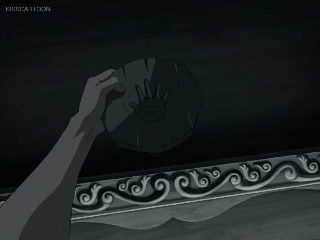
Zuko never considered himself much of a creative. When he thought about it, he realized that that part of his life had never really been explored; his father always pushed him to focus solely on his bending and combat skills, never allowing even the consideration of other practices or hobbies. As much as Zuko was passionate about the martial arts he'd mastered, he also came to learn that he never had a choice in being passionate about anything else.
“I think you should take an art class,” his therapist suggested. “It would be a good outlet for you, and one that isn't directly influenced by your family.”
“I don't think I've ever drawn anything, though,” Zuko admitted. “I wouldn't be any good.”
“It's not about being good,” his therapist explained, “it's about exploring things that weren't available to you in your youth, freedom of expression. Consider it - there's a shop in this neighborhood that offers classes.”
She handed him a business card adorned with an array of different art styles, from delicate watercolors to bright, bold cartoons; it read, “classes for everything” in a cheerful, clearface font.
Zuko shrugged and pocketed the card. A week later, he was enrolled in a basic studio art course.
He arrived for his first class embarrassingly early, passing under the bell of the shop’s front door twenty minutes before it was scheduled to begin.
The building that housed the shop looked to be older than the rest of the neighborhood around it; the storefront was tiny, with crowded shelves lining each wall and tables and racks wound throughout the center of the space, creating a maze that led to the checkout counter. The room’s ceilings were high, supported by beams in a dark stained wood that matched the floor below. Paper mache sculptures and handmade lanterns hung from the rafters, and the simple, antique plaster walls were decorated with paintings and sketches, likely given by the shop’s clientele. From somewhere in the back, a radio sang folk music, accompanied by the hum of an electric fan.
Zuko wandered through the labyrinthine merchandise displays until he reached the register, where he was met with the single most beautiful sight he may have ever laid eyes on.
You stood behind the counter, leaned over a textbook with a pencil in hand, tapping it back and forth over the pages; you bit your lip in concentration, a few strands of your hair falling loose from the messy knot atop your head and over your cheeks, though you were too focused on your reading to care. An apron bearing the shop’s logo was tied around your waist, emphasizing your body's dramatic curves.
To Zuko, you were gorgeous. He couldn't place what exactly about you allured him; all he knew was that his pulse had quickened to a near dangerous pace.
You looked up at him when you noticed you were no longer alone, flashing him a kind, somewhat distracted smile. He nodded curtly, too nervous to do anything but stare.
“Can I help you?” you greeted him politely.
He cleared his throat, his voice coming out a pitch higher than normal as he spoke.
“I'm here for the art class,” he told you.
You smirked a little, peering down to check the time on your phone.
“It's a little early,” you said. “I was just about to start setting up. You could help me if you want? So you're not so bored while you wait?”
“Yeah,” Zuko mumbled, “yeah, sure.”
You grinned, waving him behind the counter and through a door to the back room. To his surprise, what he expected to be a minuscule stockroom turned out to be a space larger than the actual shop, lined on one wall with massive warehouse windows that poured late afternoon sunlight into the room. Metal shelves and boxes lay haphazardly about, mixed in with a scattering of easels, pottery spinners, canvases, and other art supplies. You directed your guest to a stack of chairs in the corner, instructing him to line them in a half circle in an empty portion of the room while you placed the easels.
“So, do you have a name?” you asked, attempting to make conversation that could drown out the repetitive radio drone.
“Zuko,” he introduced himself.
You stopped what you were doing, fixing him with an awed, slightly amused gape.
“Firelord Zuko?” you wondered.
He blushed, nodding.
“Oh spirits, I'm sorry I didn't bow!” you exclaimed, dropping into a low curtsy. The gesture was mixed with equal parts mirth and genuine respect; Zuko was unsure how to respond, his heart flickering as he watched you.
“I heard you were living somewhere in the city,” you continued after making your own introduction, setting an easel in front of each chair he positioned. “Not into the whole royalty thing?”
Zuko shrugged. He focused on his work, too nervous to look you in the eye.
“Just weird going back there,” he told you. “I don't really want taxpayer money going to making sure I live above my means.”
You leaned against the last chair he set down, smiling warmly at him.
“That's very respectable,” you responded. “Thank you. Y’know, as someone who pays taxes.”
Zuko chuckled softly as you handed him a bin of art supplies, instructing him to set one of each item at every station. He did as he was told, stealing glances at you whenever he was sure you weren’t looking.
“So, uh… do you own this place?” he asked, fumbling over his words.
“Oh, no, this is my professor’s shop,” you replied. “I just work here part time.”
“You’re a student?”
You shook your head.
“Nope. Graduated last year. I work days at the history museum downtown. I also give art history classes here, and help out with the ones Professor Cong teaches.”
“Oh.”
Zuko paused, unsure of what else to say.
“... They teach a different type of history just for art?” he asked after a moment.
You laughed, covering your mouth to muffle the sound and apologizing, giving him a little nod as you collected yourself.
“Yes. Some people even get whole degrees in it,” you giggled. “Not that it’s a useful field to learn anything about.”
Zuko shrugged, trying to shake off the embarrassment of sounding stupid in front of such a cute girl; little did he know, you found the question beyond endearing.
“It sounds important,” he contested. “I’ve been meeting historians from all over the world to correct all the propaganda from the past hundred years. It never occurred to me that I would need different historians for art.”
You smiled at him, meeting him where he stood and handing him one of the sketch pads from your bin. His cheeks pinkened, his eyes darting away from yours as he took it and mumbled a “thank you”.
“I like you, Firelord Zuko,” you decided aloud. “My classes are on Wednesdays. You can come if you want - free of charge.”
Zuko nodded, swallowing heavily as he met your gaze once again.
“Thank you,” he replied. “I appreciate it.”
You laughed a little bit, taking his now empty bin and returning both to their place on a nearby shelf. The shop’s bell rang from beyond the threshold and you went back to the front counter, telling Zuko to take a spot wherever he liked. He sat in the front row; wherever he thought he could be closest to you.

For the next five weeks, Zuko attended not only his studio art class, but your art history class, showing up early to each lesson so he could spend time alone with you. Despite the fact that you invited him to sit in, he paid the fee for the second course, not wanting you to go without the extra pay for your work - he found a doodle of a turtle duck on his seat the next time he showed up, the fuzzy little penciled duckling telling him he was a terrible listener, but thanking him anyway (with a heart scribbled in beside the words).
With your guidance, Zuko learned that there was much more to art than just vibrant colors and pretty decoration. Everything in art, it turned out, had significance, each piece and work holding insight into the people and cultures who created it; you spoke passionately about the art of the Egyptians, who used specific shapes and colors in their imagery to tell stories beyond the written word, about the mysteries of prehistoric structures that revealed how early humanity was much more sophisticated and interconnected than considered at a glance, about the symbols that translated and influenced across centuries to shape how each nation, each culture, portrayed themselves into the modern world. He found himself hanging on every word, falling even more deeply enamored with you with each moment he spent with you.
It didn’t take you long - what with the easy, pleasant conversations you shared before classes - to discover that Zuko lived relatively close to you, only two stops away on the local metro. Knowing this, you often saw each other on the days you weren't at the shop, meeting at the station between each of your respective neighborhoods and having coffee or dinner in one of its many cafes, talking about anything and everything and managing to pass several hours together in what seemed like the blink of an eye. You loved being with Zuko, finding the more you did it, the less you wanted your rendezvous to end; you thought about him all the time, getting all kinds of giddy whenever he crossed your mind.
On one of your extracurricular excursions, you and Zuko wandered around the local high street, marveling at the different streetside vendors and dreamily window shopping behind the glass of the upscale boutiques, doing little more than enjoying each other’s company. It was a hot day, and along your way, Zuko stopped at a coffee stand to get you each something cold to drink.
A pretty young woman in line in front of you eyed you up and down, her gaze flicking from between you and Zuko with disgust. She jabbed her slim, graceful elbow into her equally as flawless friend’s side, whispering something in the other woman’s ear as they both glared at you, sniggering cruelly behind flat stomachs and angular, willowy frames.
You sneered at them, making a point of hooking your arm within Zuko’s and pressing your much wider hip against his, the poison of the encounter sinking into your skin and infecting your thoughts. Zuko noticed your change in demeanor immediately, steering you away from the scene as soon as your drinks were served.
“You okay?” he asked, still holding tight to your arm.
“Fine,” you quipped, biting back tears. “Just a couple of pretty bitches proving how fucking hideous they are on the inside.”
“Wait, seriously?”
Zuko halted, pulling you to the side of the street and out of the way of traffic. He lay a hand on your shoulder, the firm, able grasp of his palm somehow making you feel even worse.
“Someone would really make fun of you?” he wondered, outraged and incredulous. “Why?”
You shook your head, smiling defeatedly as your lower lip quivered.
“People have made fun of me since I was a kid, Zu,” you told him, speaking as if he should’ve just assumed it. “I’m fat. You can’t tell me you haven’t noticed.”
“So?” Zuko replied. You were so shocked, you physically leaned away from him, raising your eyebrows. “Yeah, you’re fat. That doesn’t mean you’re not pretty. I… I think you’re really pretty. Gorgeous, even. You’re beautiful.”
You blinked at him, taken aback. He gave your shoulder a reassuring squeeze, his eyes never once leaving yours.
“... Did I break you?” he tried after a moment, sounding concerned that it was a genuine possibility.
You laughed, shaking your head in feverish disbelief, attempting to clear the confusion that fogged your battered brain.
“No, I just… Nobody’s ever called me pretty and fat before.”
Zuko shrugged.
“Both are true,” he told you. “I like your body. You look like one of those Greek sculptures. Of the goddesses.”
You stared at him, searching his eyes for any sign of dishonesty or patronization; all you found looking back at you was the clumsily genuine man you were quickly falling in love with.
“... Have I ever told you about Aphrodite Kallipygos?” you asked.
Zuko shook his head, as confused as you had been a few seconds ago.
“She’s a statue of Venus,” you explained. “She’s got her dress raised up over her backside, and when they found her originally, she didn’t have her head; the guy who restored her sculpted it so that she was looking back at herself, admiring her body. There’s even a whole folktale about a pair of brothers who fell in love with two women because they had, like, beautifully fat asses and the town built a temple dedicated to Venus and her butt. The name literally translates to ‘Aphrodite of the Beautiful Buttocks’.”
Zuko chuckled, raising the hand at your shoulder to cup your cheek.
“See?” he said. “Men have worshiped thick, juicy butts since the dawn of time!”
You laughed, your cheeks turning bright red as you buried your face in your hands, leaning forward to rest your forehead on his chest and further hide yourself.
“Zuko, oh my god,” you breathed. “Promise me you’ll never say that out loud in a public setting ever again, please. You’re the fucking Firelord for Tui’s sake.”
Zuko chuckled, wrapping an arm around your waist and hugging you tightly.
“Sorry,” he mumbled, still grinning. “Made you feel better, though.”
You pulled away from him, affectionately punching him in the shoulder. He laughed, gasping at you in mock reproach before pressing a finger into your side, shocking you with a burst of static electricity; you cackled as you jumped away, sticking your tongue out at him.
Zuko felt a rush of lightheadedness as he watched you, savoring the sound of your laugh and the radiance of your smile. It was then he realized he was in love with you.

The next studio art class focused on model drawing - more specifically, a nude model. Zuko, having been raised in what was arguably the most reserved family in the world, was nervous about the idea of having to sit in front of a stranger for an hour, not only staring at their naked body, but immortalizing it in graphite on a page.
He was mortified when he arrived at the class and found you sitting in the corner, wrapped in nothing but a silk dressing gown.
As you climbed the platform you were meant to model on, your limbs rattled. You began to question your sanity, wondering what you thought you were doing offering to pose for the class, what kind of statement you thought it would make. You faced enough judgement from others about your weight with your clothes on - what the hell did you think they would do when you stood before them completely naked, every bump and crevice on full display for them to gawk at and criticize?
You glanced to the side at Professor Cong, seeking some sort of assurance or comfort from him; he, being the seasoned professional in his mid-sixties that he was, sat reclined in a chair in his Hawaiian shirt and flip flops, scrolling totally undisturbed through Pinterest on his phone. Honestly, you expected no less - his obtuse reactions in the face of the awkward and uncomfortable were basically a superpower.
Taking a deep breath, you untied the knot holding your dressing gown together and let it fall, slipping gracefully from your shoulders and to the floor. You assumed a comfortable, classic pose, purposely facing yourself away from the man whose eyes you could feel searing into your back.
Zuko’s breath hitched as he watched you undress. Though he only saw the full of your body for a moment, he was captivated. The swell of your breasts and curve of your stomach sent him into a dizzy spell, his mouth going dry and his skin heating with a noticeable flush. The rolls of your back, the ripples and divots along your thighs and rump, the stripes etched into your skin like the veins through a granite block, he drank in every part of you, moulding every detail with a focused hand as he sketched. He made note every scar and beauty mark. Once or twice, his mind drifted towards the salacious, imagining how your body would feel beneath his, soft and supple, releasing exalted breaths and enraptured moans, your nails dragging down his back as he drove you closer and closer to infinity…
He inhaled sharply, snapping himself back to his work. You were Venus, Minerva, Diana - a goddess among men. He would gladly spend the rest of his life worshiping you.

The moment the class ended, you gathered your dressing gown and made a beeline for the employee bathroom, getting back into your clothes as quickly as you could physically manage. The experience of nude modeling wasn’t nearly as harrowing as you expected it to be; you actually found it kind of freeing, being able to show yourself to a room full of other people and come out of it unscathed, in fact feeling quite beautiful - what had you nervous was the fact that you’d have to face Zuko immediately after the fact, seeing as you took the train home together after classes. His was the only opinion you cared about, and you wanted nothing more than to convince yourself that he hadn’t judged you as harshly as the self-hatred brainwashed into you made you believe.
When you emerged from the bathroom, Professor Cong stood in front of one of the empty easels in the back, smirking at the drawing the student had left there.
“Your boyfriend left you his piece,” he teased.
You blushed, glaring at him as you approached and snatched the sketch from his hands.
“He’s not my boyfriend,” you tried in vain to defend yourself.
Professor Cong just chuckled.
“I’ll believe that when I see evidence to the contrary,” he replied.
You looked down at the paper in your hand and felt the breath drain from your lungs, your heart and stomach soaring into your throat.
Zuko had drawn you in the image of Venus, your body draped in gossamer fabric and your head turned over your shoulder, eyes cast downward and lips slightly parted in a blissful, ethereal expression. In the corner of the page, he’d written “Aphrodite Kallipygos” in his sweeping handsome script, beneath which was his signature and the date. You’d never once seen yourself look so beautiful, let alone in the eyes of someone you loved so fiercely.
You swallowed hard, rolling the drawing and securing it with a hair tie from your bag before exiting the shop through the back, knowing Zuko would be in the alley waiting for you.
“Hey,” he greeted you when you appeared through the storeroom door. “Are you okay? You looked really ner-”
You interrupted him by throwing your arms around his neck, slamming your lips into his in a desirous kiss. It took him less than a second to recover himself from the shock of the action and curl his arms around your waist, pressing his body against yours and lifting you every so slightly off the ground, kissing you just as hard as you kissed him. When you parted, you were breathless, your cheeks fiery red and your lips swollen the color of vermilion. Zuko smiled at you, one side of his mouth curling up slightly higher than the other.
“So you liked it?” he asked.
You laughed, nodding.
“Zuko, I loved it,” you gasped. “I love you. I think I loved you as soon as I met you but that sort of thing is really cliche and stupid to admit.”
Zuko chuckled, raising his hand to your cheek and kissing you again, his lips soft and tender this time around. You sighed happily into his mouth, closing your eyes and losing yourself in the feeling of his body sharing the same space as yours.
“I think I loved you the moment I met you, too,” Zuko confessed, his nose grazing against yours as he pulled away. “But you’re right. That sort of thing is really stupid and cliche.”
You giggled, tugging gently on the collar of his jacket.
“Come on,” you prompted him. “Let’s go back to my apartment. You’ve already seen me naked; we need to make it even.”
Zuko laughed, wrapping an arm around your shoulders and leading you out of the alley, his side pressed firmly against yours.
“Fair,” he agreed. “But if you want me to pose for any art, you’ll have to sign some paperwork. I’m still Firelord, you know.”
📚 table of contents 📚
✨ join me on patreon ✨
{ subscribers: @ladylizzieofdarbyshire @celamoon @omgwhattheeven @i-am-not-a-thot @fandomtrash1616 @dream-alittlebiggerdarling @just-another-romantic @berkeliums @eridanuswave @oleander-in-the-wind @kinismanditory @lammello @peppermenty @theawesomefactor123 @loganrwebb @ijustwannabecanadian @a-hopeless-fan @softvv @oddment-niwit-blubber-tweak @pearl-stonecutter @crazy0t @commander-rex @kittyddandnyla @abbyarchie @smol-grandpa @nonbinary-rogers @themanwiththemetalarmsdoll @witchywrter @canibea-whore-yet @fuckwhateverfuck @eridanuswave @duh-dobrik @sum-stuff13 }
#muerta's works#zuko#zuko x reader#zuko x you#prince zuko#prince zuko x reader#prince zuko x you#prince zuko fanfic#zuko fanfic#zuko fanfiction#zuko fluff#prince zuko fluff#prince zuko fanfiction#zuko x plus size reader#firelord zuko x reader#zuko modern au#modern au zuko#prince zuko modern au#atla modern au#modern au prince zuko#atla fanfic#atla fanfiction#self insert fanfiction#self-insert#self insert fic#self insert
73 notes
·
View notes
Text
The Rupture/ The Rapture - Subtextual Grammar and Castiel’s Relationship to Dean in 15x03
Hey everyone,
Catching up British time and just seen the ep, so looking forward to seeing all your posts and gifs shortly! Firstly, some musings of my own.
Has Berens’ ripped everyone’s hearts out already? That’s some pretty potent symbolism right there for heartbreak huh? (Sorry Ketch):
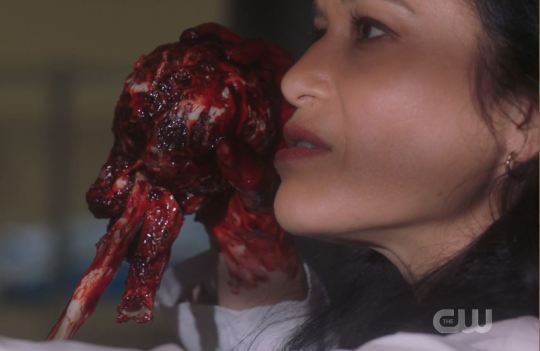
The Rupture recalls, in subtext, through visual symbolism, Castiel’s long narrative journey in relation to Dean. So that Dean and Cas’ break-up, already foreshadowed by Chuck and Amara’s “divorce” in Reno last week, at the end of the episode (for those following the symbolism) is given extra punch.
Firstly, the title, The Rupture 15x03 deliberately recalls, following Dabb’s ouroboros (circular/ spiral) narrative structure, The Rapture 4x20. That episode was critical for Dean and Castiel’s relationship. Castiel rebelled against Heaven and entered Dean’s dreams (his intimate space) in order to try to warn him about the angels’ plans by passing him a love note:

In the subtextual grammar of the show, that pier incident, has become a symbol of Dean and Castiel’s intimate connection. For example in 14x10 Nihilism, you can see a pier at sunset with a figure standing on it in the background on the wall, behind Dean’s mind-Pamela:

And remember, mind-Pamela profoundly represents Dean’s feelings for Castiel in that episode. Recall her costume, with the winged necklace and the T-shirt symbolising Dean’s salvation from Hell by Cas? And mind-Pamela, in Rocky’s Bar, is someone Dean wants, but thinks he can’t have.
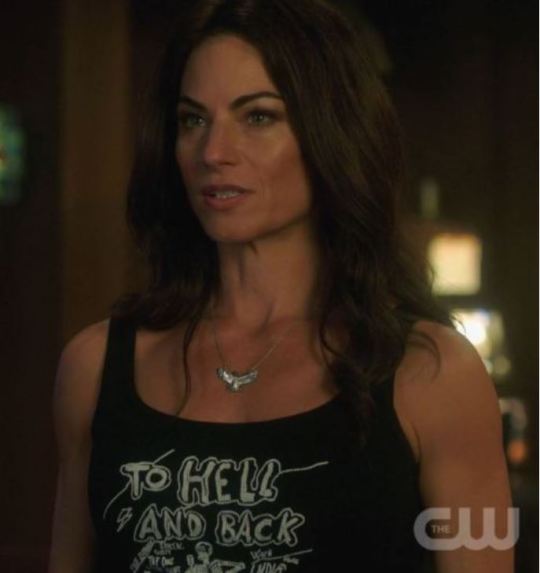
Of course, Castiel was dragged back to Heaven and punished for his disobedience in 4x20 The Rapture, yet, eventually, as we know, he rebelled again and chose to help Dean over Heaven. So, when Berens recalls The Rapture in his episode title, The Rupture, it is to remind us just how much Castiel has sacrificed for Dean.
“I rebelled, and I did it, all of it.... for you” (5x02 Good God Y’All).
As Cas said to Dean last week, in 15x02 Raising Hell, what’s “real”, despite Chuck’s machinations?: “We are.”
Cas can see (at that point) that his connection to Dean has profound meaning, at least for him (a profound bond, indeed) because Dean helped Cas finally break free of Heaven’s control. Something (we learn in 8x21 The Great Escapist) that Cas had been trying over and over to do for aeons, only to be mind-wiped and re-programmed again and again. Naomi tries to torture re-programme Cas, yet again, in 8x17 Goodbye Stranger, by getting him to murder endless Dean clones in Heaven (making it very clear that the source of Castiel’s free will and resistance is his connection to Dean specifically). BUT Cas’ bond with Dean is too strong, and he breaks free of Naomi’s conditioning when faced with the real Dean, bloodied and on his knees, telling him: “I need you.”
If anything in Chuck’s multiverse symbolises free will it is Castiel’s rebellion against Heaven for Dean.
What Cas isn’t clear on, by 15x03, is that the “profound bond” continues to have any meaning for Dean himself. As he says, bitterly to Belphegor:
Cas: “Sam and Dean are just using you. Don’t mistake that for caring about you, because I an assure you, they don’t.”
Bel: “Wow, you learn that the hard way?”
The symbolism, of Castiel’s journey in relation to Dean, continues in 15x03 in the visual grammar, as we see Cas, literally, jumping into Hell:

which of course recalls what we all know so well - that Cas fought his way into Hell and rescued Dean from Alastair’s clutches and resurrected him:
Castiel (to Dean): “When we discovered Lilith’s plan for you, we laid siege to Hell, and we fought our way to get to you...” (4x16 On the Head of a Pin).
This shot of Dean and Cas together in 15x03, literally at Hell’s mouth, with a gravestone between them, likewise symbolises that event (Castiel’s resurrection of Dean from Hell) as well as the present “death” of their relationship:
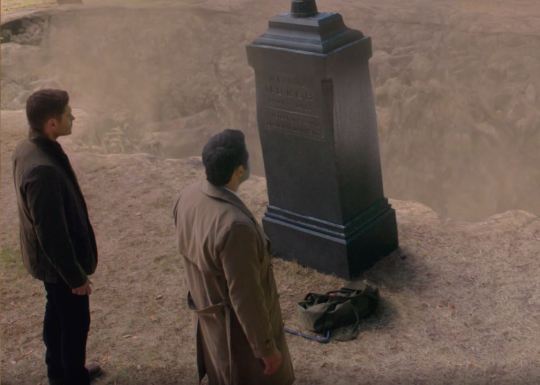
So, it’s no accident that the magical object Castiel is tricked by Belphegor into retrieving from Hell in 15x03 is Lilith’s crook. Because (as in the 4x16 quote above) Lilith was the demon who worked to ensure Dean was dragged to Hell, to be broken by Alastair (whom Belphegor re-mentioned, also not by accident, in 15x01 Back and to the Future) thus breaking the first seal to jumpstart Lucifer’s return and the apocalypse.
All these reminders of Castiel’s significance to Dean, of Castiel’s salvation of Dean, of how they averted Chuck’s apocalpyse before (in S5), together, at the very moment of their break-up....
So, when we see Castiel on his knees in Hell, reluctantly singing a praise hymn in Enochian to Lucifer in order to achieve access to Lilith’s crook, aka magic horn? (Belphegor explicitly refers to the crook as a “horn”).
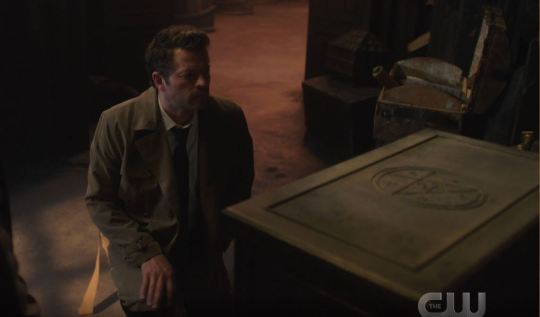
Well, in subtext, the magic horn (Lilith’s crook) can be read as a sexual metaphor.
This symbolism is the juxtaposition of the sacred and the profane - an angel at prayer in Hell.
And following the shot of Cas kneeling in Hell, we get this shot of Dean, looking down into the Hell-mouth...
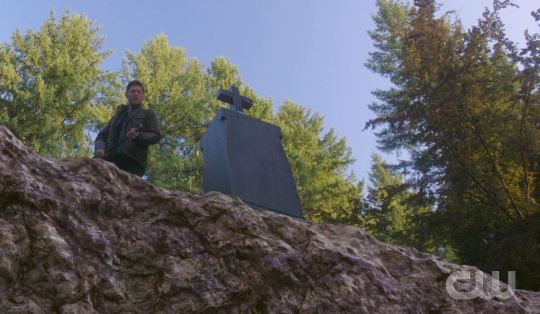
A visual reversal of Castiel’s rescue of Dean from Hell in S4.
Castiel passes the “magic horn” to the demon wearing the body of his beloved son, Jack:
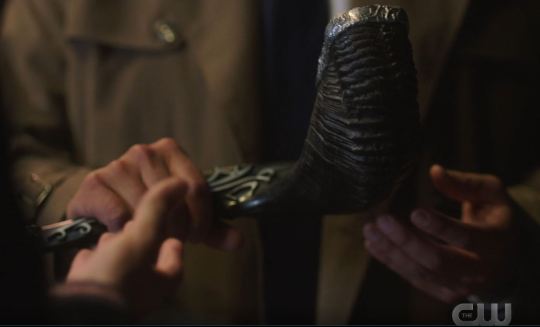
Jack who always, in subtext, symbolised the (forbidden) love between Dean and Castiel (his adoptive parents) because, as a Nephilim, he was the product of (forbidden) human-angel congress.
Here at the start of S15, we know Castiel is losing his angelic powers after trying to heal Sam’s God-wound, and the show has previously been quite clear that becoming human entangles Cas in the world of human sexuality. We’ve seen that in 5x04 The End with Castiel and the orgies he shares with Future!Dean:
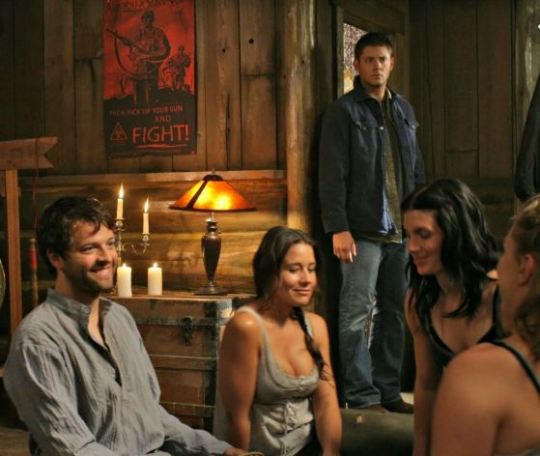
And we also saw it (crudely drawn by Bucklemming) in 9x03 I’m No Angel, when newly fallen Human!Cas has survival sex with the Reaper possessing April (yes, ugh - consent issues all round):
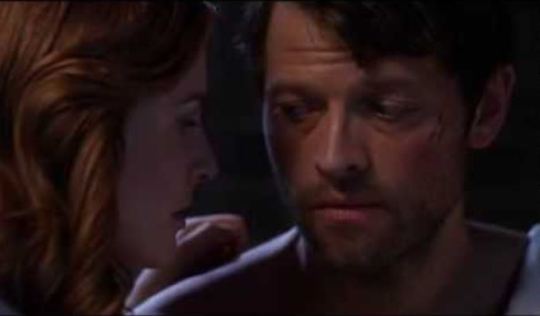
Belphegor pleading with Cas in Jack’s voice reminds us of everything Jack meant to Cas. Cas, after all, once towed Heaven’s party line and regarded Nephilim as “abominations”. We saw that in 8x22 Clip Show, when Metatron inveigled Cas into killing a Nephilim, in order to obtain her heart, for his (subtext-heavy) angel-fall spell, and we also saw it in the flash-back sequences in 12x10 Lily Sunder Has Some Regrets when Cas believed Akobel deserved to die for (supposedly) fathering a Nephilim child with Lily.
What was once profane to Cas has become sacred.
Jack, and loving Jack, represented (among other things) for Castiel, some kind of accommodation with his own secret heart. If the child of an angel (Lucifer, no less) and a human could NOT be a monster, then maybe an angel loving a human might not be monstrous either, despite Heaven’s edicts.
But then Jack (apparently) killed Mary, and the Winchester family, whose always previously shaky membership (for Cas), Jack’s co-adoption with Sam and Dean had cemented for him, was blown apart.
In 15x03 Cas is forced to kill Belphegor wearing the body of Jack:
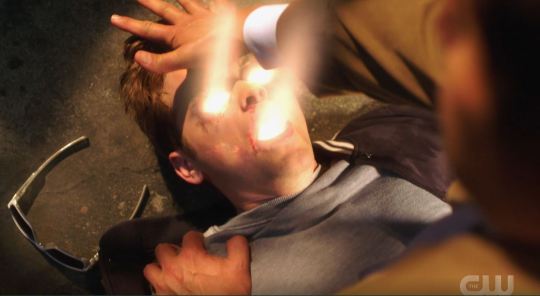
And the death of Jack’s Nephilim (human-angel union) image, becomes, in the visual grammar, a metaphor for the death of Castiel’s hope of any continuing union between him and Dean - the death, on Dean’s part, Cas believes, of the profound bond. Hence we get a corpse-shot:

And Castiel’s tears:
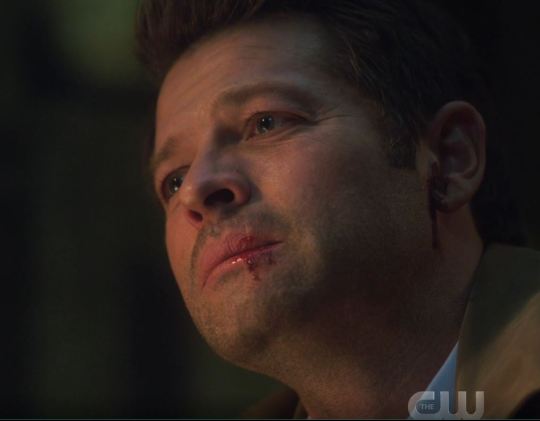
Castiel echoes (having absorbed them) Dean’s unkind (grief-stricken) words to him from 14x18 Absence, “You’re dead to me!”
Cas (to Dean): “I’m dead to you.” (15x03).
After everything they’ve been through together (to Hell and back, as carefully illustrated in the visual grammar of 15x03) Castiel has utterly lost hope that he has any remaining emotional meaning for Dean; without Jack, without Mary, without his powers.
Walking away (as the Winchester family signature music plays poignantly in the background) is a huge (and ultimately positive) step for Cas, who has, over the years, more and more built his identity and his meaning around his connection to the Winchesters, following his long rebellion against (and rejection by) Heaven. After everything Cas has been through (the narrative suggests) he deserves to be his own person, to be loved for himself (not his powers) and not to be taken for granted.
And so we are left with the LOUD narrative negative space of Dean’s silence at the end.
We can see Dean’s tense body language, in the final shot, half poised as if to spring forward, half frozen to the spot, as Cas leaves:
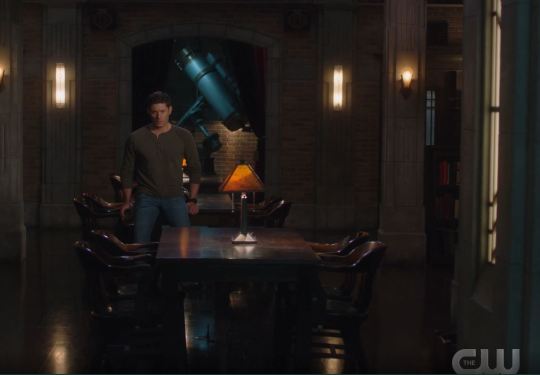
That silence in the narrative structure, which is mirrored in the symbolism of the ghosts/ demons being temporarily re-bottled up in Hell (like Dean’s feelings) as well as in the re-death of the feminine in the form of Rowena (because the feminine in the grammar of SPN = feelings) DEMANDS words, at some point down the road.
Last time Cas was human, Dean kicked him out of the Bunker (thanks to Dean’s coercive pact with Gadreel) and we saw Cas’ broken-hearted suffering over that break-up in 9x06 Heaven Can’t Wait (Berens’ very first episode for SPN):
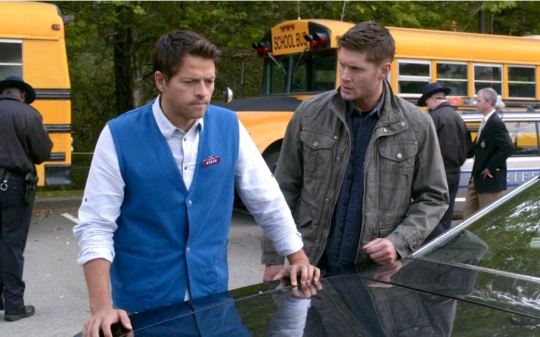
This time, Cas has more agency. He decides to initiate the break-up, because his heart (and how very human of you, Cas) can’t bear being treated to Dean’s silence, Dean’s anger and Dean’s (apparent) indifference any longer.
Now, we need not only to see Dean come to his own broken-hearted realisation over this (reverse) break-up (after all, we’ve seen Dean broken-hearted over losing Cas, to death, before now) but for Cas to see that realisation, in Dean.
In The Rapture (4x20) we are told the story of how Castiel the angel came to take Jimmy Novak as a vessel - how the angel we know became conjoined to the human-form we best know him in:

In The Rupture (15x03) Castiel is losing his angelic powers again, moving once more towards inhabiting Jimmy Novak’s vessel, which is now his own body (Jimmy’s soul long-gone, and indeed that body destroyed and yet resurrected AS Cas, several times), as a human.
Last time Cas was human, Dean missed his shot. How about this time?
The Ouroboros narrative is taking its final turn.
My usual disclaimer: subtextual readings do not inevitably indicate or imply that textual romantic declarations will be forthcoming between Dean and Cas. That element of the story has been told in subtext for 10 years (and that’s where it quite likely will remain, in the terrain of ambiguity). Subtext IS however, part of narrative.
Nevertheless, an emotional reconcilliation of some sort, however readable as “brotherly”, comrades-in-armsy, nebulously “familial” etc. is, by story-logic, absolutely inevitable.
That which is parted will be re-joined - Chuck to Amara, Cas to Dean.
#Supernatural#15x03#The Rupture#SPN meta#Meta#4x20#The Rapture#Destiel#Still subtext#But subtext IS part of narrative#Long post for TS#If anyone is still using Tumblr Savr?
782 notes
·
View notes
Text
Icarus: The Fall of Hawks
The system also tells him to ignore people he can save if he thinks it will be more beneficial in the long run. But Ultimately, Hawks continues to put his trust in the people that are using him, because he sees no escape and no alternative.
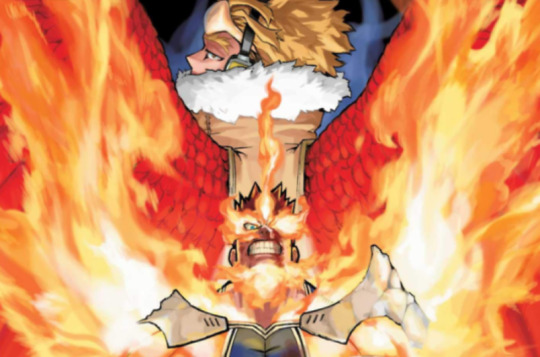
The icarus symbolism surrounding Hawks character is already a common fandom theory, but I decided to give a comprehensive take. The closest thing I could find to an original post on this theory was: this one.
The winged hero Hawks draws many mythological allusions to the boy Icarus most famous for flying too close to the son causing his wax wings to fall apart.
Son of Daedalus who dared to fly too near the sun on wings of feathers and wax. Daedalus had been imprisoned by King Minos of Crete within the walls of his own invention, the Labyrinth. But the great craftsman's genius would not suffer captivity. He made two pairs of wings by adhering feathers to a wooden frame with wax. Giving one pair to his son, he cautioned him that flying too near the sun would cause the wax to melt. But Icarus became ecstatic with the ability to fly and forgot his father's warning. The feathers came loose and Icarus plunged to his death in the sea.
The story is inextricably linked to Hawks’ character, foreshadowing that his two flaws, his admiration of Endeavor (the sun) and his habit of flying too fast will cause him to fall into villainry.
1. Hawks: Set Up by the Hero Commission to take the Fall
Foreshadowing occurs in a literary text when the author gives clues and hints about what is to come in the story. That in itself is pretty well known, but there’s more to it than just giving hints. It has a lot to do with the way stories are structured. Basically, stories are all composed of set up and pay off.
Foreshadowing is not just for cheeky hints or setting up which characters might die, it’s a sign that the author as a whole has the story planned out. The reason that scenes in stories get an emotional reaction out of us as readers, is because authors set up these characters as somethnig for us to get invested in, build up those emotions, and then eventually pay them off on the expectations we have built up.
Which is why when reading stories a general good strategy is analyzing What does the author want me to think? What are they trying to lead me to? Ideas are introduced, developed and get paid off more and more as the story progresses. A good story will continue building up these ideas with the intention of leading them somewhere, which makes them purposeful. This goes hand in hand with the concept of chekhov’s gun, that is every idea that the story spends time on will eventually become meaningful in some way.
'Chekhov's Gun' is a concept that describes how every element of a story should contribute to the whole. It comes from Anton Chekhov's famous book writing advice: 'If in the first act you have hung a pistol on the wall, then in the following one it should be fired.
To wit: The reason why all this icarus symbolism is surrounding Hawks is not just because he’s a cool flashy character that’s popular, he’s actually one of the most important characters in the story right now tied to the flaws and exploitations of the hero system that Horikoshi has been setting up since chapter one in the manga with this line. People are not born equal, that’s the hard truth I learned at age four.
Here’s a quick example of developing ideas in the story especially tied to Hawks. The first time we here Destro is when Gentle explains about him as one of the legendary villains he aspires to be like, the arc before Hawks is introduced as a character.
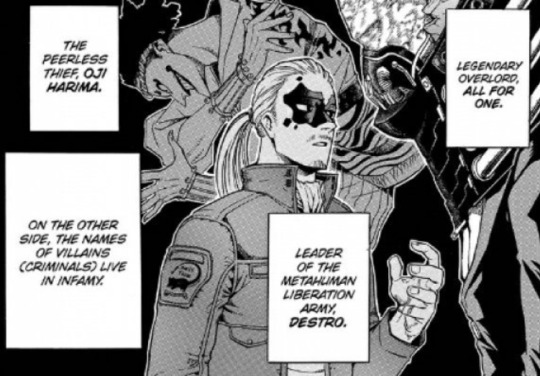
The next arc after the school festvial arc, Destro’s book is shown as inspiring one person the same way it did Gentle while hawks is talking with Endeavor.
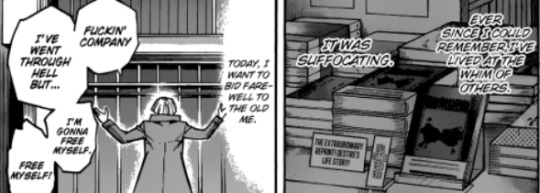
After the class A vs B arc, in the My Villain Academia arc not only do we learn that Destro has a son and followers that are still alive, but at the end of the arc Hawks is shown interacting with the liberation followers. Ideas are introduced, developed to give them more depth, and most importantly they always show up linked to Hawks.

Why does Hawks always up in association with Destro? Esepcially when hawks is not a quirk supremacist like the rest of the MLA. It’s because as a character, Hawks’ deepest desire is liberation, and yet it’s also the thing that he’s furthest from. The character with wings who can freely fly in the sky, is chained down with the most responsibility.
There are two important pieces of foreshadowing in Hawks’ introduction chapter. First that he shows a dissatisfaction with the current hero system around him, and a tendency to see through others especially when they are putting on airs.
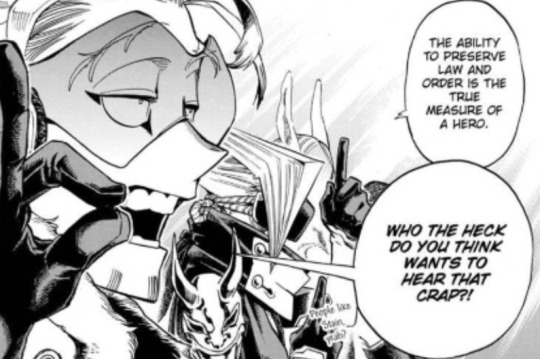
The second is this shot in particular, the spotlight in the background like a sun in the center of the sky with Hawks ascending towards it and losing feathers the same way Icarus would.

The other most important detail from this chapter is how Hawks is described. Not only did he make the top ten in his teens which makes him a young man like Icarus in the story, there’s also the oft repeated phrase with hawks - He goes too fast. Going too fast, flying too high, too quickly, these are all things that come come before Icarus’ fall. Special attention is drawn to how young he became a hero which we will get to later.
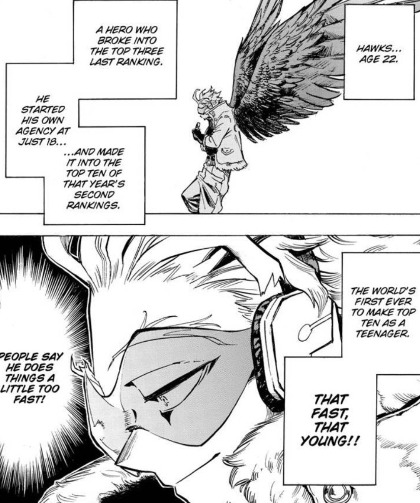
In chapter 186 there is a piece of foreshadowing used mainly as a joke, that also ties in with the idea of liberation with Hawks character mentioned earlier. This is a point taken from the meta linked at earlier, but considering what we now know about Hawks’ character that he is a kid raised by the hero system who has to kowtow to the higher ups this internal dialogue could easily resemble Hawks.
They key difference being Hawks never lets himself admit to having these feelings, or acts on them. He is much more concerned with keeping up his carefree facade.

From as far back as I can remember, I’ve lived my life as a bootlicker. It’s been suffocating.
While the scene itself is a joke, the connection to Destro’s book and the idea of liberation are both themes that connect strongly to Hawks. Another connection is a similiar scene that took place in Vigilantes which directly references Icarus in the same context, a man getting naked as a part of his quirk. Vigilantes is the canon prequel of My Hero Academia and has several plotlines important to the main story, even Aizawa’s canon backstory so this is highly relevant.


Once again this is set up as a gag but my flight is a forbidden one is an idea that could easily relate to Hawks. After all, Hawks has wings and yet cannot use them for himself, and cannot take flight on his own because he is under the thumb of the Hero Commission.
The way Hawks’ powers work is also important. He has feathers that give him wings that can fly, and yet because he is able to autonomously move his individual feathers we see him often giving up his feathers for other people and multitasking for several people at once. Quirks are often a metaphor for their users, Hawks has wings to fly, but his feathers don’t belong to him, the more he gives up for other people the more he loses his wings.
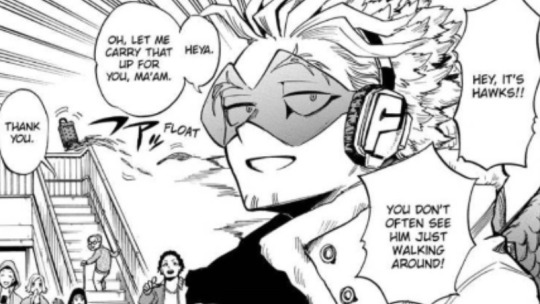
When Hawks uses all of his feathers he is unable to fly anymore and starts to fall, the same way the wax melted and the feathers flew apart the only thing Icarus could do was plummet.

Hawks feathers also become useless to his when they burn up. This, and the cover page featuring Endeavor burning his wings up not only sets up an eventual conflict with Endeavor, but one that Hawks’ quirk will most likely be weak to the flames.

The scene with Dabi. Hawks is introduced to us with the light backlighting him as he ascends towards it. Now, in the conclusion of this arc, the light in the background of the scene is where Dabi moves towards while Hawks himself covered in shadow walks away from light and descends into the dark foreground.

There are also two more joking points of foreshadowing in this chapter, both setting up an eventual confrontation with Hawks and Endeavor. The first is Endeavor noticing the suspicious timing, and the second is Endeavor threatening to roast him which he has threatened at several times already. Even if it’s a joke it’s a serious threat, Endeavor has been characterized as someone incapable of handling his emotions and lashing out in violence several times in the past.

Not only is Hawks set up to fall however, the hero commission sets him up to fall as well. A one man investigation into the League of Villains as a double agent. The hero commission outlines it for him, he will receive no back up, and nothing in return for his service. There is already a team set up by the commission to fight the league of vision, but they came to Hawks specifically for this reason. He works alone. He cannot say no to them. They knew before asking him he was already going to say yes.

It’s a situation where the Hero’s commission has nothing to lose and everything to gain. Hawks will either fall or fly completely on his own. If the villains kill him, they lose a hero but that’s it. If Hawks messes up his mission and gets caught, the commission can pretend that he really did turn traitor and abandon him. Hawks is completely expendable to them, and yet any information he can grasp is valuable. At the same time, Hawks has everything to lose and nothing to gain. Being a hero is Hawks entire life. He literally has no name outside of his hero name. As stated above he could easily be abandoned by the hero commission if the mission fails, and yet at the same time the only thing Hawks gets out of this is the idea that some people will be saved by his actions. Even though he is specifically instructed not to do anything to save people in front of him if it would jeapordize the mission.

While yes, Heroes working to save people and sacrificing themselves for the sake of others is a good thing, hawks always sacrifices himself all the time. Being a hero not only consumed his whole childhood, but also his life. This is not Hawks volunteering to do it on his own, this is him being given a mission he cannot refuse and going along with it.
The hero commission sets Hawks up to fall in their place. Hawks gives up his wings for them, and because of that he falls instead of flying.
2. Flaw: His Trust in Endeavor and the System as a Whole
Hawks is a child that was taken in by the hero commission and abused by them. Hence the reason why he was such a young rising star is because he had no childhood to speak of. The only way his family could be uplifted out of poverty was if he followed the track they provided for him. He is treated like a prodigy, but really he spent all of his time as a hero, and was given no other option but to become a hero.
Which is why Hawks admiration of Endeavor is ironic, considering that Endeavor attempted to do the same thing to his own son. Not raise his son with love and care, but rather breed him, train him since he was a child, and raise him not as his own person but as a hero to be used for his father’s ambitions. Hawks, Shouto, both of them were reduced to the powerful quirks they had and not treated as people. Which reflects the point that the Meta Liberation Army could have had if they were not quirk supremacists, that quirk society being dominated by strong, flashy quirks, and judging people by those quirks ends up limiting the path ways people can take in life.

This contradiction makes sense when you take into account Hawks’ upbringing. Hawks has a complex reaction to his abuse. He genuinely does want to save other people as he works himself to the bone doing it, and yet he’s also aware the hero system is using him. Part of Hawks resents the hero system, and yet Hawks is also a product of that system who still reflects the ideas he was raised on whether he wanted to or not.
This is why Hawks comes off as being such a two-faced person. He’s in a lot of major ways, in denial about his own place in life. He acts casual and friendly, and yet he’s more burdened and more isolated than anyone else. He deflects almost everything other people throw his way with humor, isolating himself even further. He also contradicts himself quite a lot, he calls out Endeavor onstage and then in the next scene he says he was doing that for Endeavor’s sake. Both are probably true, Hawks resents the hero system, but he also has to have the appearance of a friendly, willing to help others hero, because that’s the only way he’s survived so far. He likes to keep himself aloof and unattached to others because that is literally the only freedom he can grasp yet.

When Hawks says he never was a big fan of All Might, it’s most likely because Hawks sees himself in All Might. The idea of someone who as a hero is forced to save absolutely everyone and have the entire peace of the country resting on only their shoulders, only to be used until they break down is a nightmare to Hawks.
Not only does Hawks not want to be shouldered with the responsibility, not because he’s lazy, but because he knows how exploitative it is but he also does not see himself of ever being able to carry that much. The hero system that Hawks was raised on made him believe that a brute firepower quirk like Endeavor’s that is good for defeating villains is what will put people most at ease, not the constant saving of others, or interactions with people, or the creative use of his quirk that Hawks employed.
Not only is Hawks whole life defined by his quirk, but he is also taught that his quirk is not good enough. The only person who will put other people at ease, is a quirk like All Might’s. Only an extremely powerful quirk that’s suited best for fighting villains.

Hawks even says he does not want to take up the role of All Might, and it’s in part due to his feelings of ineriority, but also his want to escape his life and find some small freedom. Which is when Endeavor, the embodiment of the toxicity of hero society says that he hates guys like Hawks the most. Even though Hawks’ intentions here are pretty clear, instead of trying to step down and let Endeavor take the spotlight and support him from the shadows. Endeavor represents the individualism of hero society, but Hawks is trying to play support. He was raised by hero society, but also Hero Society actively condemns the kind of person that Hawks is.
Once again we see the contradictions in Hawks behavior. He is one of the most selfless heroes in the series as he continually lets himself be used, and yet Hawks pretends that he’s a coward who does not put himself on the line, or fight directly risking his own life.

It’s not just putting on an act, Hawks is also taught to believe that if he stays back adn plays support, if he does not defeat the villain head on with a violent quirk that he is weaker.
Which is why despite representing the exact kind of opposite hero that Endeavor is, he turns out to be a fan of Endeavor. This is because Endeavor is everything Hawks was taught that he was should be, but not. Endeavor fights for number one, he has a powerful quirk, he has the highest villain defeat record. All the things which Endeavor values are the things the hero system values, whereas Hawks believes he’s selfish for wanting a little personal autonomy for himself.
Endeavor is able to be strong in a way that Hawks never will be, because Hawks is not nearly as selfish as Endeavor is. Of course he does not see the victims of Endeavor’s actions quite yet, so he would mistake that for Endeavor able to make his willpower a reality in a way that Hawks cannot and gave up trying to do.

It’s not just putting on an act, Hawks is also taught to believe that if he stays back adn plays support, if he does not defeat the villain head on with a violent quirk that he is weaker.
Which is why despite representing the exact kind of opposite hero that Endeavor is, he turns out to be a fan of Endeavor. This is because Endeavor is everything Hawks was taught that he was should be, but not. Endeavor fights for number one, he has a powerful quirk, he has the highest villain defeat record. All the things which Endeavor values are the things the hero system values, whereas Hawks believes he’s selfish for wanting a little personal autonomy for himself.

It’s not just putting on an act, Hawks is also taught to believe that if he stays back adn plays support, if he does not defeat the villain head on with a violent quirk that he is weaker.
Which is why despite representing the exact kind of opposite hero that Endeavor is, he turns out to be a fan of Endeavor. This is because Endeavor is everything Hawks was taught that he was should be, but not. Endeavor fights for number one, he has a powerful quirk, he has the highest villain defeat record. All the things which Endeavor values are the things the hero system values, whereas Hawks believes he’s selfish for wanting a little personal autonomy for himself.
Hawks is a victim of the hero system, and even is able to see its flaws, but due to his own taught inferiority, and how much he lets himself be used for the sake of helping others he cannot see himself as a victim or change it from the inside in any meaningful way.
Not only that but he fails to see the important flaws in someone like Endeavor, and isntead chooses to still believe that the hero system is ultimately in the right because they are on the side of saving people. Icarus is a tale of self destruction. Hawks is selfless to a self destructive extent. He keeps letting himself be used by people who see him as nothing more than an asset to them, because he believes it to be for the greater good. However, the current system always utilizes people like Hawks, vulnerable, expendable, Hawks is always the one who has to sacrifice his own personal freedom even though he has given his entire life to the system.
The system also is not as interested in saving people as it is in numbers, look how it talks about giving their all to rescue a kidnapped boy as some kind of failure of priorities. As if it was wrong to immediately try to help a child.
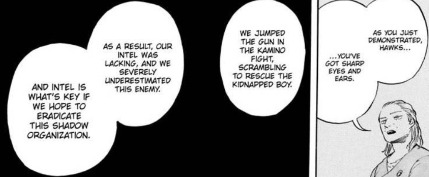
The system also tells him to ignore people he can save if he thinks it will be more beneficial in the long run. But Ultimately, Hawks continues to put his trust in the people that are using him, because he sees no escape and no alternative.

3. Flaw: The Man Who Flies too Fast Alone
Hawks always contradicts himself, despite the fact that he’s obviously much better as a support and rescue type hero, Hawks always fights alone. His biggest flaw is how much he always takes on himself, the fact that he flies too fast.

Hawks is aware of the fact that he is used by the system. There are several signs that Hawks is actually a manipulative person. Not in the sense that he is a bad person who tries to use others, but rather he developed the ability to manuever and manipulate other people as a way to cope and find what little freedom an security he could. His personality is a big indicator because Hawks almost never shows his true face and is almost always deflecting. He makes it hard for others to get a read on him by being such a two-faced person, which grants them less control over him and him a little bit more freedom.
At the same time Hawks is shown repeatedly to have information then others expect him to have. Endeavor gets surprised when he mentions Shoto, and the Hero’s commisison gets surprised when he is already aware of the team investigating Kurogiri and yet he never reveals his source on either occasion.

Instead once again he falls back on his common strategy of deflection to stop them from pressing on the issue. Hawks is someone who wants to rely on others more because he feels powerless on his own. Yet, at the same time Hawks has been taken advantage of so many times it’s impossible for him to trust others. Not only that, but Hawks has also been taught that he should be strong enough to do everything on his own, that is the individualism hero society promotes.
This is also how Hawks had to be in his early life. The only reason his family got money was because he was of use to the hero commission. He always had to be at the top of his class, always had to be useful, always had to finish on his own. Hawks always does things on its own because it’s a learned habit, he’s never had anybody else to rely on. Not only that but his way of living has always been unstable he might have been dropped back into poverty if he did not continually rise to meet the expectations of others.
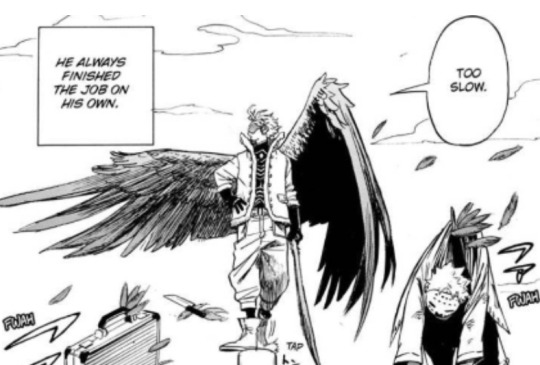
Which is where we are presented with yet another contradiction of Hawks character, he is always working all by himself, but he only ever works for the sake of others. His only selfish desire is some time off for goodness sake. He is blessed with tremendous talent but has never been able to use it for himself, because since childhood he has been put to work for the sake of other people.

Hawks also says that he took Tokoyami on as an intern because he wanted information, which once again Hawks is constantly shown to be privvy to information he does not know and trying to collect more. This is because Hawks does not trust, because he cannot trust. He will be used by the other people around him. That is why he tries to seize as much information for himself as possible. Hawks being manipulative is just him trying to control what little he can, because if he does not do that then he ends up being the one who is controlled. The more knowledge he has, the more power he has.
People who feel helpless as a child due to circumstances entirely out of control will try to grasp for control in any way they can. That is why easygoing Hawks always does things on his own, because not having to rely on other people gives him more control. He can control himself, but not others. Easygoing Hawks is a bit of a control freak.


This scene becomes interesting if analyzed from that level. Hawks says he has no interest in training the next generation, it makes sense somebody who was raised from childhood as a hero and nothing else would probably have no interest in raising other children as heroes. His last line becomes much darker as well.
Those who can fly, should! Why keep yourself grounded?
Hawks is someone who keeps himself grounded all the time, always giving up his own freedom for others, and yet we see freedom is the thing he yearns for the most. He is intoxicated with the idea of freedom, the same way Icarus became intoxicated once he gained his wings and looked at the sun.
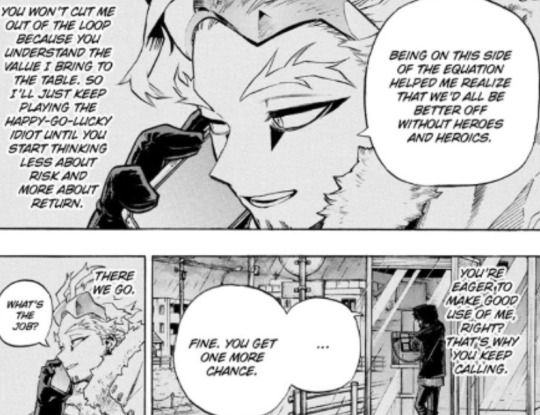
In his phonecall with Dabi we get a lot on Hawks’ internal monologue. First he admits to the fact that he plays happy-go-lucky idiot and lets people assume that they can use him, in order to control their perceptions of him. His way of manipulating others has always been to try to let them use him, instead of trying to make use of them because that is what Hawks has been taught. His value is that he is useful. He tries to navigate the system from the inside rather than breaking out. He keeps letting himself be used.
However, once again Hawks words to Dabi do not sound entirely like lies, or they could even be lies to himself. Being on this side of the equation helped me realize that we’d be better off without heroes and heroics. How much of that is a lie when Hawks was exploited into becoming a hero, when his deepest wish is to be allowed to be something else other than a hero for a little while?
It’s easy to see how Hawks got to the point where he seriously could consider Killing Best Jeanist. The people who are injured or taking time off are not useful to the system, they need to be sarcificed for the greater good. He was told by the same system to let people die if it would save more people in the long run, that he cannot be the hero he wants to be. That he has to dirty his own hands for the sake of everyone else. Hawks is constantly going against his own wishes to do what is right for other people.

Hawks says not to let a person’s resolve go to waste, because he believes that all of his determination, that all of his flying too fast is going to lead him somewhere. His determination is indeed a heroic quality, but it’s something that makes him keep sticking with the system rather than giving up on it. It’s something that makes him believe that he can overcome all of this on his own. However, no matter how hard Hawks works for the hero system, the only ones who have something to gain from it in the end is the hero system and not him. His hard work and determinations only guarantees he becomes more useful to them and will be used more.
In this light, Hawks’ belief that he can handle everything on his own is hubris, his determination to become such a good hero that he will get time off is a flaw. The only ersult is that Hawks is used more and more as a cog, and he grinds himself down further and further.
However, just like All Might could not save the entire country of japan all on his own shoulders forever, Hawks’ good boy act is also something that will not last him forever. The more he’s exploited the more he will break down. The ones to catch him when he falls is most likely not going to be the heroes system, because they are exploiting him and forcing him to work on his own because he is expendable that way. If he falls only he falls alone. Hopefully, when Hawks does fall, Dabi and the league will be there to catch him and sympathize with him in a way none of the heroes ever could.
#hawks icarus theory#icarus theory#mha meta#hawks icarus#hawks meta#hawks#my hero academia meta#meta
495 notes
·
View notes
Text
How to Love Revision
A lot of you lovely folks are doing Nanowrimo right now.
Which means that, in a few weeks, you will have a steaming pile of pages. A rough draft. A word-baby, if you will. And you might, at some point, want to turn that messy jumble into a real book, perhaps something to send to a publisher or publish yourself or just share with people.
I see a lot of writing advice about finishing first drafts -- and a whole lot of it is in the vein of “Just write it! Fix it in post! Finished is better than perfect!” which is great advice for pushing through, but does tend to leave future-you -- the editor you-- with problems.
Lucky for you, I happen to love editing (really! it’s my favorite part!) so I am here to give you some advice on how to turn those pages into a proper story without ripping all of your hair out or screaming into the void (but if you need to scream, it’s OK, I won’t judge you.)

First Off: Credit Where It’s Due
My current revision process draws heavily from Holly Lisle’s One-Pass Revision technique: https://hollylisle.com/one-pass-manuscript-revision-from-first-draft-to-last-in-one-cycle/
Her writing guides are golden, and I heartily recommend reading them all, starting with that one up there.
I don’t do one-pass revisions, but her ethos really helped me. Before I found her advice, I would get caught in the endless revise/rewrite cycle. I was going through 9+ drafts of every story and it kept morphing into something new and sprouting new problems, hydra-style, every time I tried to redo it. So nothing was ever finished, nothing was ever satisfying, and I hated it.
So I found a better way! And it freed me! I’ve written six books since then, four of them published (one Wattpad-exclusive) and I learned to look forward to the second draft.
So how does this magic work? Let me show you!
Step One: Put the Damn Thing Away
Editing requires intellectual and emotional distance. So finish your story, and set it aside for a while. Stop thinking about it. Actively put it out of your mind. Work on something else for a while. Read a book. Catch up on all the TV you missed. Whatever. The point is -- you don��t want to come back to revise your story until you can look at it with fresh eyes.
How long this will take depends on you, of course. It’s a very personal thing. It could be weeks. It could be months. For me, a good guideline is to wait until I can no longer quote whole passages from memory.
Now then. Let’s do some triage.
Before you can start editing, you need to know your goals. If you’re a planner, this might be easy because you have an outline you can compare against. If you’re a discovery writer like me, well, this is the time to figure out what exactly it is that you discovered. Grab a notebook (or a notepad file, if you’re a digital native) and follow this process:
Write a one-sentence elevator pitch that roughly encapsulates the concept of the story. It doesn’t have to be pretty -- you’re not showing this to anyone but yourself -- but it does have to be honest. My one-sentence pitch for River of Souls was “Self-aware zombies struggle for equal rights, but the medication they rely on to retain their humanity doesn’t work as advertised.” My pitch for The Hound was “Lesbian thrift shop owners invite the devil into their home after buying a cursed taxidermied dog.”
Write down your theme(s). In the draft, themes might take the form of questions. In this draft, you’ll want some answers. What do you want the reader to feel when they’re done? What is the message you’re trying to tell? When I wrote Nezumi’s Children, I knew it was a story about religion -- “What should we put our faith into?” In the end, I decided the answer was, “We should put our faith in each other.” That dictated the ending. (I also wanted to be careful not to inadvertently support abandoning your pets -- so I couldn’t let the rats be happily feral at the end. A happy ending for them meant being owned and cared for).
Write a 250-word synopsis of the story. Again, it doesn’t have to be pretty. It just has to introduce the characters, the world, and the general shape of the story arc -- the inciting incident, the escalating stakes, and how the character changed at the end.
You may find that you struggle with this part, and that is totally find (and honestly to be expected). You may discover, for example, that your character doesn’t actually change, or that there isn’t a core conflict. That’s okay! That’s what you’re here to fix! I have absolutely, definitely written a book and then discovered 80,000 words later that it didn’t have a plot. It’s OK though, because you’ll fix that problem in the next step.
If you do indeed have a plot and escalating stakes and characters who go through developmental arcs, you’re ahead of the game. Now you’ve got the skeleton of an elevator pitch and the makings of a query letter (or a jacket blurb).
Next: Map Out Everything
When I was in elementary school, I had to start writing my first essays. I was supposed to make an outline, then write the paper to follow the outline. I wasn’t very good at doing it that way, so instead I would write the paper, then hastily draw up the outline to match what I said. Oops. Nothing has changed, honestly.
With your trusty notebook (or blank text document), compile the following:
Write out a list of scenes. Just a couple words describing the events of what happens. Now - are all of those scenes necessary? Are any redundant? Do you need to add foreshadowing or establish something earlier in the story to make sense of it? Are the scenes in the wrong order? Does every scene do some work to advance the plot, deepen the character, flesh out the world? Does the ending resonate with the theme? Re-write the scene list in the correct order, with scenes added or removed as necessary to tell the proper story. Now your scene list is a handy dandy roadmap/outline for your revision!
List out all of the characters in the story. Write down their role in the story. Does every major character have a goal? Do motivations make sense? Does each one change in some way during the story? Are all of your walk-on roles necessary? Are there characters who don’t really do much, and could you combine them?
Fixing plot holes on your scene list is a lot easier than fixing them in the manuscript itself. Keep tweaking your scenes until the story feels like it works. Make sure there’s a logical flow between events -- cause and effect, escalating stakes. Consult structure guides like the Hero’s Journey or the Three-Act Structure if you need some help with your plot.
Here’s a part that’s really important so it’s going in all caps: THE SCENE LIST IS FINAL. Make all the adjustments you need to the plot while you do the scene list, but do not -- DO NOT -- deviate from the story once you move on to the next step. You don’t stop modifying your scene list until you’re happy with the story, and once you’re happy, THAT is the story you’re writing. Get new ideas for things that can happen? Great, save ‘em for the next book.
Now Roll Your Sleeves Up And Get Dirty
Some people like to print their manuscript off and do edits in pen, but I don’t have reliable printer access most of the time and hate wasting paper. So instead, I pull up the rough draft and adjust it so it takes up one half of my monitor. Then I pull up a fresh, empty file and put that on the other half of the screen.
Now, using my scene list as a guide, I pull up the rough draft and rewrite it, scene by scene. Yes, that means re-typing every word. You’ll find that when you do this, you’ll fix a lot of language mistakes without even realizing it. I’m an under-writer, so my drafts usually double in length during this process because I spend more time lingering on sensory details, adding scenes, teasing out character dynamics, etc. etc. etc. Just let yourself go, get immersed into the scene. If you forget what you were doing, just refer back to your outline and original draft to get back on track.
I find this process works best if you can do it quickly. Try not to let the story get cold. Ideally, work on this every single day, or even set aside a long weekend to just hammer it all out.
Finally: Make a Second Pass
Now that you’ve got a second draft under your belt, it’s time to celebrate! Set the book aside. If you have beta readers or an editor, now is the time to send this to them. Hang out for a bit. Figure out who you’re querying, if you’re doing that. Find a kick-ass cover, if you’re self-publishing. Build yourself a Lego mansion. Whatever. Just sit on your draft for a little bit.
Now that a couple weeks have passed, it’s time to make a final pass. Gather all of the feedback you’ve gotten from beta readers and editors and decide what advice you should take and what you can ignore. Here’s a guideline: If someone says something and you think, “oh, yeah! that’s exactly it!” then you take the suggestion. If they say something and you think “uh, well, no, that’s not really the story I was trying to write....” or something similar, you can ignore the feedback. Good feedback will always feel true in the “duh, why didn’t I think of that” way.
Open up your new draft and, starting at page one, just read the damn thing. Make adjustments to the writing as necessary:
Correct any misspellings and typos you come across.
Eliminate weak words and phrases and replace them with stronger ones.
Add some variation to sentence structure if you notice that it’s become repetitive.
Eliminate redundancy. Fix your metaphors. Fix your symbolism. Keep your poetic language on-theme. In The Hound, I replaced a ton of random metaphors with dog imagery. It’s subtle, but it lends thematic cohesion.
Some people use things like Grammarly or Hemmingway App to help with this. I’ve never used them, so I can’t speak to their effectiveness. But if you find that they help, awesome! Use them!
Here’s a really important point: This step can ONLY come AFTER the rewriting stage. There is no point at all in tweaking sentences and fixing up the language in a story that has no plot. Fix your structural issues FIRST, and be sure they are AIR TIGHT, before you start dicking around with the words. Ok? Ok. (Someone go back in time 15 years and tell this to young me please)
And now...you are done!
Spend some time tweaking your elevator pitch and query letter at this point, if necessary. But no matter what, you do not go back into this document and change ANYTHING unless an editor tells you to. The book is DONE. Maybe give it a final proofread before you self-publish it (but honestly, you’re better off hiring someone to do it at that point, you’re going to be too zorched to notice the typos you missed) but otherwise don’t touch it. Don’t think about it. Write the next book.
And that’s it! That’s my mostly painless revision process!
Obviously every person is different, your mileage may vary, etc. But I hope this serves as a helpful jumping off point. I am more than happy to answer any questions or provide clarification on things -- just drop me a line :)
34 notes
·
View notes
Photo
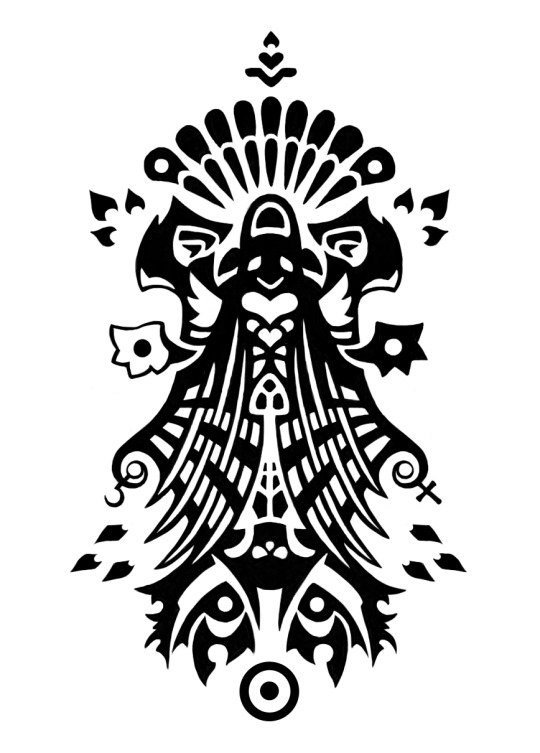
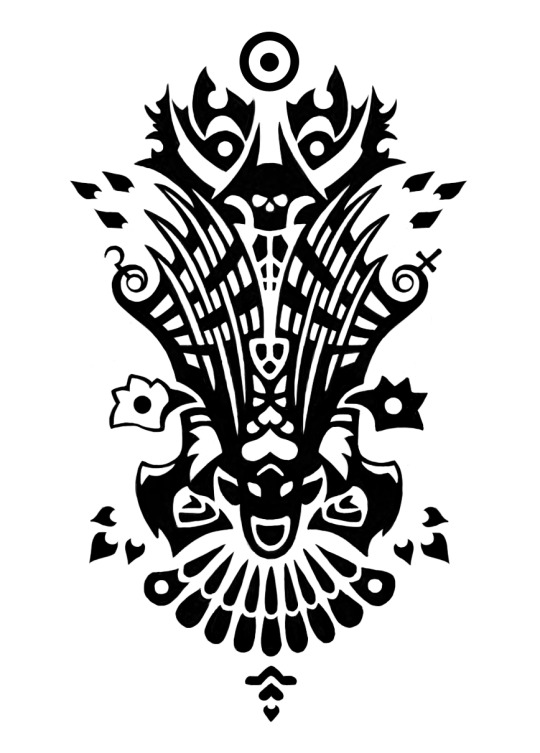
Okay, so I'm thinking of getting a tattoo. I have been for a while, but I've finally kinda decided on what I want to get. I'm thinking I'll have it done on my upper back and oriented angel-side up. The images are attached and I'll kinda talk about what it means, then why:
The image itself is reversable as shown, and is comprised of an angelic figure and a demonic one which cannot be separated from one another.
The figure is holding the stylized zodiac symbols for Pluto and the asteroid Persephone, as Pluto is my astrological chart ruler and sole dispositor, while asteroid Persephone is conjunct my natal Sun. From the demon’s perspective, these are held aloft and wielded like weapons, but from the angel’s, they are offered out as gifts.
The zodiac symbol for the sun lies at the bottom of the image (yet over the demon’s head), as my natal Sun is conjunct my IC when the chart is cast in Whole Signs, representing the lifelong theme of illuminating the subconscious. Over the angel’s head is the symbol for the asteroid Vesta, which is conjunct my North Node, representing the lifelong imperative for understanding and serving God.
There are nine rays of light over the angel’s head, representing the nine enneagram types, and twelve flames, representing the twelve zodiac signs and houses. I chose these because these two systems have given me the most invaluable guidance over the years, and 9 x 12 = 108, which is a holy and important number to me. Lastly, the wings represent the balance of light and darkness and are a form of yin-yang.
The image itself is mostly derived from the mask of the character from Final Fantasy XXIV I've been enamored with, the Ascian named Hades (obv. named after Pluto/Hades) or Emet-Selch. “Emet-Selch” being his title of office, which translates to “the Architect,” which coincidentally/ironically is what the astrologer I see titled me after looking at my chart for the first time, saying that I was well suited to destroying old structures in order to rebuild them more soundly.
For the sake of having it written down, the reason I'm so fixated on the character is that Hades was an immortal, belonging to a race with the godly power to create anything from imagination. Unfortunately, their civilization fell when they lost control over their minds and therefore powers, and inadvertently brought all their worst nightmares to fruition. This metaphor is an appropriate reminder for how we create our own realities, however blessed or cursed, and symbolizes the vital importance of maintaining a clear, open mind and not letting fear run my life.
As one of only a handful of Ascians to survive, Hades dedicated his eternal life to trying to free his friends and family from the reincarnation cycle they were cast into upon death, in hopes that they would someday be able to reclaim their power and end their unnecessary suffering.
Unfortunately for him, his friends did not wish to return to their godly positions (at least by his means) and ultimately killed him. This serves as a reminder to myself that I do not know what is best for others and it is not my place to decide such things. It is an apt reminder of the vital importance of humility...and, of course, the fact that just because I'm trying to help someone doesn't mean they'll appreciate it in any way (though, to be fair, I don’t plan on using genocide in my tactics).
On the whole, the tattoo will serve as a reminder to myself that pain and death are as necessary and sacred as peace and life, that all difficulties in life can be as much a blessing as a curse, and that self-awareness, the intention to grow, and the willingness to surrender to the higher power’s plans is how we best come to understand God and achieve freedom from suffering.
I feel like I really want to make a shift in my life, orienting me back toward my core goals and spirituality in general. I feel like aligning myself with Pluto (which, by the way, I realized is in aspect to every planet in my chart except the moon, which I'm currently experiencing anyway as a Pluto-trine-Moon transit) is something I was meant to do. Because Pluto is my chart ruler, sole dispositer, is conjunct Scorpio's traditional ruler (Mars), and is in aspect to everything else in my personality to boot, I should really have no problem with its energy. I MEAN. But (I guess?) because it's in my 12th house, it really is pretty repressed and awkward, and is thus probably one of the reasons I have always felt so out of touch with who I am and therefore the world around me. Then, to have Persephone of all the asteroids conjunct my Sun...doesn't that kinda suggest that I should be comfortable with being Pluto's wife?? Ultimately??
In any case, I feel like it's time to start moving in that direction because when Pluto conjuncts my Sun in 5 years from now, I'm gonna be REAL up close and personal with Pluto. He's gonna drag my ass into hell and rebuild me from the ground up or, at the very least feed me pomegranate seeds or whatever, and I'm gonna be married to that bastard for real. When it conjuncted my Mercury back in 2011 my mind was basically sent up in smoke then rebuilt, so I gotta assume it’s gonna do the same with everything I identify with as a person. In other words, my Persephone destiny is coming up for real, sooner or later, and the more comfortable I am with Plutonian energy the more the balance of that transit and the changes it enacts will shift from horrifying to empowering.
That's why I want to start returning to that kill-the-ego-dead headspace, since I have since drifted more into a peace and love mentality, and I feel like this is part of that. A rebranding of sorts to get my head back in the game...you know, through enduring a long and painful needling of my back.
14 notes
·
View notes
Note
Hopefully fun challenge: can you talk about three things you love more about TVD than BTVS and three things you love more about BTVS than TVD? You can pick more than three if you come up with more!
This is fun!
Things TVD did better than BtVS:
1. Kept the show fun, interesting, and consistent. I know seasons 4 to 8 of TVD are messy, but they’re still better, funner, and more consistently engaging than seasons 4 to 7 of BtVS. I love TVD seasons 5 and 6, but I’m bored by the correspondent BtVS seasons. Even when TVD was a giant mess, it was an entertaining mess that didn’t assassinate its characters quite as badly as BtVS did. The TVD lore also makes more sense than the BtVS lore. Anything can happen on TVD, and with that in mind, it’s easy to go with the flow and enjoy the story no matter how crazy it gets. But BtVS is more grounded and when the story became very dramatic, “dark”, and complicated, the show lost its charm.
2. Kept the characters true to themselves. BtVS changes a lot each season, and the latter seasons are so relationship oriented, that the characters become strangers sometimes. It’s not that TVD didn’t ruin its characters at times, but, in general, my opinion of the characters doesn’t vary wildly from season to season. I know who the characters are, and they change accordingly to the progression of the show. The characters remain recognizable to me, which is comforting and natural. Also, some characters on BtVS look dead inside in the latter seasons while the TVD characters are always bursting with feelings, ambition, desires…
3. The relationships. I love Bangel and other BtVS relationships, but the TVD relationships are just more. It’s not just Delena, or Klaroline either. It’s Stefan and Damon; Alaric and Elena (who are cuter than Giles and Buffy); Jeremy and Elena (who are more realistic than Dawn and Buffy); Bonnie, Elena and Caroline (who, in a way, are more organic than Willow, Buffy and Xander); Katherine and Nadia, etc. Damon, Elena, Stefan are a better “love triangle” than Angel, Buffy, Spike; and, Damon, Katherine, Stefan are a better “love triangle” than Angel, Drusilla, Spike. I don’t love every single TVD relationship, but, in general, they make more sense to me, and I’m more invested in them.
4. Mystic Falls vs. Sunnydale. Mystic Falls feels so much more like a real, albeit abnormal, quaint, little town than Sunnydale does. Mystic Falls is a huge part of TVD. We know how it looks; we know its history; we know the council, the founders, the police, the residents. The characters interact with the town in a real way. I care about Mystic Falls because the TVD characters love Mystic Falls and want to make it better. But the BtVS characters are “stuck” in Sunnydale and feel obligated to keep it safe.
5. The aesthetic of the show. I really like the late 90s look of the first BtVS seasons, but TVD has prettier sets, wardrobe, props, even music sometimes.
6. Emotion. I know it’s blasphemous to say this, but TVD has a much tighter hold on me and my emotions than BtVS does. Most of the strong emotions BtVS inspires are sad, or Bangel related. TVD makes me cry sometimes, but it also makes me feel complex emotions. The characters and their relationships stir things up deep within. I love the show, and the characters, and I think of them like they’re friends or loved ones. I know a lot of people feel this way about BtVS, but I never did. In the end, I love TVD more than BtVS because of how TVD makes me feel in comparison to BtVS.
Things BtVS did better than TVD:
1. Morality. BtVS follows a clear moral code, and systematically upholds it. Things mean something on BtVS; the characters’ actions and ideals mean something. And as a result, the show stands for something which is timeless and universal: the complexity of life. TVD has a moral code, but it’s easily broken or contoured. Almost everything is permissible on TVD, and it’s very hard to care, or keep track, of who kills who, and who is in love with a murderer. In the end, it doesn’t matter.
2. Longevity and innovation. 20 years after it first aired, BtVS is still a unique show, which has inspired countless other shows. Its approach to vampires is still different from any other vampire show out there. Its female characters are still better than most female characters out there. Its LGBT credentials are still better than lots of other shows’ credentials. BtVS is timeless. Its themes are timeless, its characters are timeless. TVD ended two years ago, and it still holds up, but will its legacy be like BtVS’s? Hell no.
3. Themes. BtVS is about growing up, identity, relationships, depression, life in general... Life is truly the big bad in all seasons. It disappoints, it takes, it kills. Reality is our biggest enemy, and more than anything, BtVS is a show about reality, told with metaphors and symbolism. TVD isn’t about much in particular. It’s also about relationships, growing up, life, family, etc. but it’s not meant to be relatable or teach us anything.
4. Acting. The acting in TVD isn’t bad, but it’s what you’d expect from a series: unimpressive, uninspired. The BtVS characters truly come alive with genuine acting. Not all of the actors are amazing, but they sell their characters well.
5. Stand out episodes. Most TVD episodes are similar in structure and content. The show is pretty consistent. But BtVS has many episodes which stand out in terms of writing, structure, acting, direction, music, etc. Episodes like The Body and Hush were game-changing.
6. Better arcs. TVD is all over the place in terms of arcs and pacing. But BtVS is much better structured. There’s always a turning point in the story when the Big Bad is revealed, and another one when the odds are upped. BtVS builds up to the climax of the story much more satisfyingly than TVD.
And let me end this by saying: BtVS is better than TVD. I enjoy, and in a way, love, TVD more than BtVS, but I’ll defend and love BtVS forever. I might be over TVD is a few months for all I know...
Thanks for the ask!
6 notes
·
View notes
Note
It’s interesting how we interpret things diff in fandom. For ex, I’ve always felt negatively towards dean’s use of sex as comfort Bc of my own experiences w csa but to some other people this reads as more positive on the whole. Do you think that maybe this is what makes people have such astronomically different takes on a character/plot event ?? Maybe this would also apply to 8x17 being read as conversion therapy while others wouldn’t see it. Not original thoughts but interesting nonetheless
Yeah, this is a whole thing in literature/media interpretation classes… You know what’s wild, it’s a pretty postmodern concept that everyone has their own interpretations and there’s rational reasons why we would see things very differently based on our own experiences. Incredibly this wasn’t always the case, and it used to be that there were definitive interpretations and analysis created by a sage literary critic which were then the be all and end all of the interpretation, even if with modern eyes those might seem inherently flawed. It’s why when we learn about historical texts they teach us both the context that the original audience would have interpreted it in, the stuffy academic opinion, a range of other thinkers, and importantly the modes of interpretation to attack it for ourselves, and a chance to write our own opinions.
When it comes to fandom, people as a whole seem very set in the original stuffy one true interpretation thing, which is completely wild to me. I don’t see it as contradictory to read and reblog a dozen different metas on a scene and even if there’s one I personally lean towards, I find it fascinating to consider multiple interpretations and how they come across to people. And, often circumstantially, certain things seem to fit better than others. For example there are a few Dean hook ups I’m quite positive towards that he seemed to be in a healthy place and it wasn’t too weird, while others are quite tellingly wrongbad to me where he’s in a very poor place and it makes me very sad to see him trying to apply that comfort to very little effect. If someone writes meta that ALL of them are good or ALL of them are bad then I’m probably going to end up reblogging meta that says both to get both viewpoints to have the meta background to pick and choose to where it seems more suited to me to say either.
But I guess a lot cases people get really invested in their particular theory or analysis and can’t see past it either to how other people could think different things, or to find it interesting that they do, and to see how those ideas can be equally merited either talking about the same instance or how it can’t be applied uniformly. Some people just aren’t very flexible and get very angry about their one idea being challenged, even though something like a very specific read of a scene, like that 8x17 reads as Naomi putting Cas through conversion therapy, could be given a few different readings but it never hurts to say “this scene also can be interpreted as…” even if when you have your overall opinion of what’s going on there it might not mean as much overall.
I personally read a huge overall narrative of Cas vs Heaven as a queer kid in a conservative family so it makes a lot of sense for me to read it that way. Someone who generally leans towards interpreting him as various other things such as portrayed as a soldier first or a metaphor for him being an immigrant among humanity, or other ways in which this metaphor don’t apply so neatly might have much less use for that interpretation but I find it super weird to think of the ones that apply less to a personal read as therefore wrong. There shouldn’t be a right and wrong in this case, but a collection of interpretations you can understand, respect, see the reasoning for, but at the end of the day are not the ones you fall back on for your overall personal meaning and understanding of the show.
But then at the end of the day, I think the way we all approach the story differently and that leading to different interpretations also comes down to our need for validation etc. I approach it with a somewhat detached academic curiosity when it comes to the fandom’s meta project, as much as the story and characters mean to me, the analysis can be super fascinating but also not particularly relevant or “useful” in the sense of getting a clear grounding in tools to keep on understanding the ongoing show like abstract literary parallels to old episodes or whatever. Like, I just like reading essays branching off and exploring themes and parallels and such, while a lot of people are more interested just in hashing out a clear picture of what happened in each episode, what influenced it, and how to use those tools to guess what happens next or something, which is a fascinating practical application of analysis which is really a hallmark of fandom for ongoing projects and something I’d never even thought you could use analysis for before I got to fandom…
But for people who are much more interested in a clear interpretation of validation of their readings of characters an plot, they just want the things which will prove to be the most accurate to canon and give them the clearest answer and vindication with new episodes, and that means a lot less room for theoretical asides, and for clear answers for what things mean so that when that thread of the story continues there’s certain ground on what it’s telling them… It means a lot less room for having multiple points of views on events and knowing clear right and wrong interpretations means that it’s easy to determine how things are going.
Which I think in some ways can lead to quite aggressive fandom behaviour, not just in the obvious gatekeeping of ideas and fighting over interpretations, or refusing to engage with theories that contradict the one you’re most invested in instead of dabbling in them all, but also that when new content appears, people get upset or argumentative about events in very odd ways about what things meant. Obviously you can see it most with anti-factions which are aggressive about people applying interpretations about ships and stuff, but also with getting so rigid about a reading that if the story changes meaning, people are left in the lurch.
To not be contentious about any current specific stuff so I’ll just use a large vague example, Carver era had very clearly defined symbolism and themes and tropes, but Dabb era didn’t use these and Dabb’s approach to storytelling is very subtle in some ways and really brash in others, none of which can be read like the carefully weighted symbolism of Carver era. I find a LOT more use in analysing the emotional arcs than the symbolism between showrunner eras, even when there is symbolism, it’s often… topically applied? Presifer sat with flames burning behind him in his staff meeting, but Cas sat in front of a similar open flame pit in 14x01 and I don’t think there was any parallel in their intent or behaviour, and I wouldn’t draw the two together, but to take the symbolism of each. But for some people who had been really hugely into the language of Carver era, Dabb era completely threw them, and was physically enraging by how much Dabb wasn’t writing like Carver used to, and there was a lot of upset about how basic his writing was and how wonderful Carver’s symbolism was, and how the show didn’t MEAN anything any more. Of course it still meant TONS, but it wasn’t being expressed in the same way any more, and by running headlong into Dabb era still trying to read it like Carver era, these people bounced off completely and could never get into it in the same way as when there were very prescriptive symbolic and metaphoric rules to follow which made understanding events so easy you could just take a glance at a single screenshot towards the end and explain everything about the scene and its wider meaning in the mytharc.
(What’s interesting is that the show wasn’t previously written like this - Kripke era runs on mirrors and flips in a way which is actually more similar to Dabb era but minus, of course, 10 years of show history which makes Dabb have such a meta, kaleidoscope version of this, and it was in a very heightened, dramatic form which is very elegant and sublime and worked well as the tragedy it was set up to be… Gamble era was more like Dabb era in running more off emotions but lacked a clear symbolic language AND didn’t have the back to front structure Kripke did, being caught in the middle of completely overhauling the story, and I honestly don’t blame her showrunning in a sense that it was an almost impossible job to salvage the subtextual telling of the show from itself in the wake of Kripke essentially ending the show in 5x22 with raised middle fingers at anyone who dare continue past the original vision. Leaning into their trauma and the story’s trauma was a sensible bridge, all things considered, but it makes hers the least elegant storytelling >.> Anyway this is a total aside… it’s early in the morning and I’m just sitting here :P)
Anyway. Yeah, you can tell I do find it interesting to think about how everyone has all their own interpretations :P I mean I know it’s my own experiences which make me so annoying about having this uwu all interpretations are valid sort of approach to it as well, which is just another interpretation at the end of the day. Though I will be snobby and say I do think it’s better that people could read each other’s analysis and even if it doesn’t go hand in hand perfectly with their pet interpretations at least acknowledge it’s interesting and has its own merits, rather than dumping on it in a knee jerk reaction. But then, some people come to the show and end up with their interpretations because the emotional meaning they give is so intrinsically personal, another interpretation DOES feel like an attack, and trying to deal with people who CAN’T accept that some of us are just shooting the breeze and aren’t in a death grip to any one meaning can get very sticky. Especially when someone seems rational for a while but then on disagreeing they get very emotionally violent and it takes you completely by surprise when you thought you were just chatting and then it turns out you’ve hurt them in their most deep emotional place by being like, anyway lol whatever I still mostly ascribe to this other idea - OH NO SORRY D: WE WEREN’T ON LOL WHATEVER TERMS OH GOD OH -
61 notes
·
View notes
Text
Summer 2018 Anime Overview: Revue Starlight
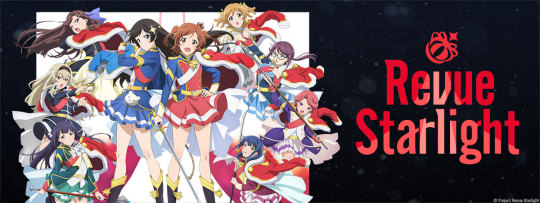
(Also known as Shoujo Kageki Revue Starlight).
Karen Aijou is training at her school to put on the annual Takarazuka play, “Starlight”. She’s shocked when her childhood friend, Hikari, suddenly appears. She follows Hikari into mysterious elevator and finds her engaged in an even more mysterious sword fight with another student that’s preceded over by a talking giraffe for some reason. She’s told that this is a competition between “Stage Girls” for the title of “Top Star”. Karen sees that Hikari is in trouble, and quickly dives to her rescue, remembering the promise she and Hikari made to become stars together. Now Karen is involved in a truly strange competition...
I was super sold on Revue Starlight from the first episode. Girls fighting with swords? Takarazuka? A random giraffe? Utena references? Nice animation? This show was made for me, clearly.

And I came out of it satisfied. It was pretty surreal and pretty gay and that’s what I’m here for. It’s hard to explain exactly what the series is about without giving away some major plot twists, I’ll put it like this- it’s very much about two girls trying to upend the vicious, cyclic system they are caught in and there are definite themes of adolescence and identity. And some characters are not what they seem. I’m always down for that.

After all, the “Top Star” system only lets one person be at the top, while the others get their dreams crushed- but Karen wants to stand together with someone. There’s a lot of light critical examination of how Takarazuka in particular is structured here- I’d really suggest checking out these posts by Atelier Emily which dig deep into the subject. Basically, there’s this understanding in Takarazuka that the “otokoyaku” (the woman who the male roles) will be top star and its the “musmeyaku” (the woman playing the female roles) must support her and consign herself to secondary status.
As Emily puts it “ [The musumeyaku must be] the perfect feminine foil so the otokoyaku’s masculine performance would stand out more in relief, [...], all while taking care not to skew too much into a romantic interest, so that young women in the audience can still imagine themselves in the arms of their favorite otokoyaku top star. Furthermore, they cannot achieve top star themselves, and must ensure that their talents do not outshine those of their otokoyaku partner.”
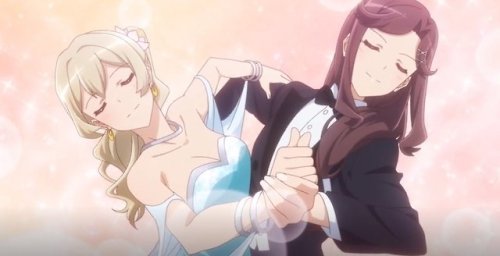
This whole dynamic plays heavily into the show- Claudine and Maya are the top otokoyaku/musumeyaku pairing in the school, yet it is Maya who gets all the attention while Claudine feels frustrated and like she’s second best. She wants to outshine Maya, but it seems like she just can’t. Meanwhile, Karen has this idea she and Hikari can be a couple who share the stage equally, which threatens to destabilize the entire system.
The series does not just examine Takarazuka but the nature of theater in general though, with the last episode in particular digging a little into the role the audience plays. It’s also touches on adolescent anxieties- we see characters coping with fear of the future and growing up, we see Mahiru struggling with her unrequited crush on Karen and her jealousy of Hikari and childhood friends finding their bond straining...of course, as expected of a series where a giraffe watches girls engage in sword fights while singing, these conflicts are expressed in a fantastical way much of the time.
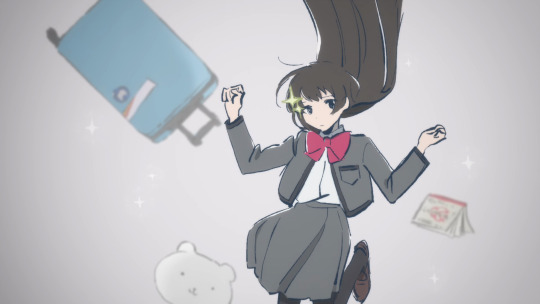
Before I go further, I should mention some cool things the series did that I really need to go back and examine- there’s a lot about the show I feel I haven’t grasped yet, and I feel I need to rewatch it before I’m able to grasp it completely. BUT I GOTTA GET THESE REVIEWS OUT BEFORE I DIVE INTO THE NEW SEASON, so this is what you get.
One thing I missed out on is that the songs the girls sing while fighting are really connected to themes of the episode- unfortunately the release I watched did not translate them, so that was lost on me. The credits sequence was also an evolving one, the lyrics would change and it would focus on a different girl or pair of girls each time- but again, not translated, so I feel like I watched an incomplete version of the show. But I will get the whole package someday because I think it’s really cool the show did that.
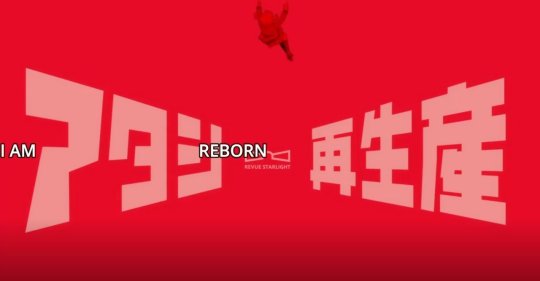
I was correct in guessing from the beginning that this series takes a ton of inspiration from Utena and also from Yuri Kuma Arashi (the director actually worked on that show) but this is very much its own thing. There are scenes in the first half that seem like they’d fit in with Love Live! or some other idol show, with girls just goofing around and ~following their dreams~, but the back half leaned way farther into the plot and metaphorical significance of the bizarre stuff that was happening.
I think the main thing Revue Starlight has going against it is character- Karen doesn’t really change much over the course of the show. She matures and is challenged a bit yes, but not in a significant way. The Karen of episode 12 makes the same decisions and has the same goals as the Karen of episode 2 essentially did. There’s not that much to her other than her determination to become the top star with Hikari, as well as her very broad “cheerful, ditzy and persistent” I’m-the-main-character-of-an-anime deal.

Hikari is a bit more complex, with some backstory and reveals about her character in store, but she also isn’t anything we haven’t seen before in a lot of ways. It was hard for me to get as invested in their relationship as I wanted- they’re just fine as characters, and they serve the themes of the show fine, but they’re so broadly sketched and kind of nebulous the emotional connection is not quite there for me.
Which is too bad, because they are EXTREMELY Gay. Don’t expect any kissing or anything ground-breaking, but the stuff they say about each other is like you know. “I only want you by my side/be with my forever/YOU’RE MINE, EVVVVERYTHINNG 222222 MEEEE THE REASSSSON I LIIIIVE IS FOR US” that sort of stuff that leaves little doubt.

The gay doesn’t stop with that.There’s also the fact that Mahiru’s is as blatant as she can be about her huge crush on Karen (she uh. goes looking for an indirect kiss at one point) and she sees Hikari as her rival, and is pretty much clearly correct. All of the other girls are clearly paired up and you’ll have them referring to each other as “my [insert name here]” or saying other stuff that barely qualifies as subtext and suggestively dancing with each other.
Like I said, nothing ground breaking, but it’s good as far as “It’s-not-as-text-as-I’d-like- but-really-barely-subtext” gay stuff goes.
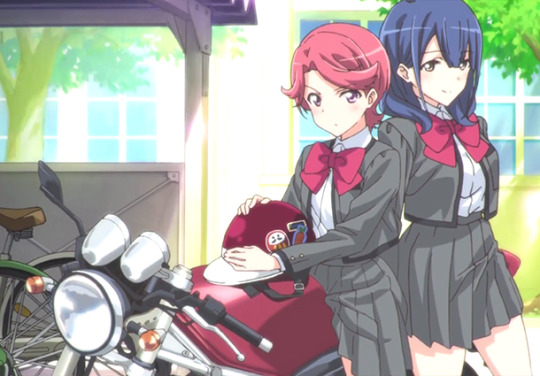
Most of our background lesbians are just a lot more interesting than the main ones, but we’re not given enough time to connect with them as much as I’d like either. Their arcs could have been more fleshed out, especially the arc of one surprising major player. I think a series with so much going on and such a big cast to explore maybe should have been a twenty-six episode deal so it could dig a little deeper with the characters and build up to things a little more.
So yeah, if I’d talk about the quality of my emotional connection and the strength of the characters and narrative and in how incisive it is, it’s not nearly as good as Utena (which I wasn’t expecting it to be, THAT’S A TALL ORDER) and more on the level of its other major influence, Yuri Kuma Arashi. It is a lot more thematically cohesive than YKA and without the deeply uncomfortable aspects, thankfully. The series may have moe character designs, but it remains classy and never indulges in blatant fanservice that I can remember.

There’s plenty of other things to touch on- there’s what seems to be light examination of the ‘bury your gays’ trope, as we find out the play “Starlight” is about a pair of HEAVILY-queer-coded-girls whose story ends with them tragically cut down and separated, and the series engages with what that show means for these girls acting it out and whether they’ll have to meet the same fate.
Honestly, it’s the kind of series you could write loads and loads of analysis for, so if you like stories you can interpret a lot and read a lot of things into, this is probably your jam. I’ve loved the discussion this series has encouraged- I advise checking out the Afictionado’s posts on the show! I can’t wait to read more about everyone’s perspectives on the show as I revisit it!

So yes, my final verdict? it’s a good show, and if you’re like me and you love stuff that centers around the relationships between girls, if you love stuff that’s full of symbolism and action and weirdness that looks at the construction of fiction and fighting unfair systems and if you think Takarazuka and musicals are cool as hell- definitely check this one out. I recommend it and there’s really nothing offputting about it I can think of. One of the “Top Stars” of the season for sure.
I’m excited to give it a rewatch and pick up all the things I missed the first time. Right now, It’s not in my top ten or anything and I can’t say it moved me deeply. it was just a bit to nebulous in a lot of ways- but its definitely a worthy addition to the “lesbians with swords” genre, and in the end, what better compliment can there be than that?
#revue starlight#shojo kageki revue starlight#karen aijou#aijou karen#karen aijo#hikari kagura#kagura hikari#maya tendou#tendou maya#claudine saijou#Mahiru Tsuyuzaki#anime overview#summer 2018 anime
48 notes
·
View notes
Photo

hey guys, it’s me again! this troll is based on a tabletop character I’ve had for almost two years who’s very dear to my heart. have fun!
I have to tell you right out the gate that I don’t have a lot of commentary here! They’re pretty well defined in all areas and you’ve very carefully considered what each part of their profile that you have means!
home planet: Alternia
name: Lelelu Luciin - based off the names they had in the game? their first name is based off their childhood name, Lellu, which was picked by the DM and as far as I know wasn’t based off anything, and their last name is based on the name they go by as an adult, Lucine, which ties into their association with divine light.
I’m almost tempted to make an Odette joke/recommendation here, but considered it has in-universe establishment from an external source, I think Lelelu is fair. I could also try to make some kind of tenuous connection about how Lelelu sounds similar to Leleu which means wolf, but… That’s not helpful. I’ve also found a few questionable sources about grammar stating that Ira Lelelu means The Disobedient in… Peterara? I think?, so there’s that take-with-a-grain-of-salt fact.
age: around 9 sweeps.
strife specibus: Fistkind. they’re quite strong and have become adept at unarmed combat.
Going weaponless is usually reserved for void players, but I do think it kind of fits their ideological bent that they would not want a lot of separation between themself and the people they fight- to be really sure that this is the right thing before laying in. I wonder if there’s any other similarly intimate weapon that they could use? Corded whips are sometimes associated with justice and retribution (see: Jesus braiding his own whip and then chasing the money changers). They could have a weapon setup so that they need to actually braid their whip before they fight, so they have to be sure they REALLY need to fight before going in.
fetch modus: Memory. this is mostly a joke based on the game they’re from, which had “all the players wake up with total Hollywood amnesia and have to reassemble their memories over the course of the game” as its premise and a throwaway line from the DM when I kept rolling poorly to recall that normally they had a pretty good memory, but since Lelelu is a fundamentally patient person who plays by the rules, I think they’d use it effectively, even if it’s not as much as Jade.
trolltag: I haven’t come up with one since I’m not really the greatest at those, ha ha!
How about ophidianDominie? It basically just means Snake Priest.
quirk: honestly I haven’t come up with one either, just because I haven’t really conceptualized their online presence? their speaking pattern is very serious, almost formal - they’re autistic and use a distinctive blend of registers that utilizes a lot of sophisticated words, but the actual sentence structures they use are personal, not academic.
Sometimes trolls really do just have some straightforward typing quirks. Maybe you could use something like Frequent Stops to represent them carefully considering their words.
Ex: I am not. Mad. Just disappointed.
blood color: jade. this is subject to change if the mods think another color would fit better! the primary reason for this is that although my character is primarily associated with a warm gold in game, they’re also heavily associated with the sun god they worship.
symbol: a version of their god’s symbol (a roughly T-shaped sunburst best seen here) that’s been modified to fit the jade rules. if we’re going by Extended Zodiac rules, I would use the jade/Prospit/Hope sign.
lusus: a horse-sized swan with a snake’s head. they keep its feathers and sew them into a shiny white cape.
special abilities: they’re a rainbow drinker. obviously rainbow drinking is tied to their status as a jadeblood - I chose this because of a rainbow drinker’s enhanced strength, agility, and glowiness, which are all abilities my game character has, but if there’s something else that fits the bill for a non-jade, I’d be fine with it. (the white marks on their design are scars, which retain a degree of luminosity even when they tone down the rest of their skin.)
they also have an old, discarded cherub juju, though they’re not aware that’s what it is. they discovered it along with accounts of a noble defender of justice who fought and prevailed against a mighty evildoer and believed that the defender described was a troll from long ago, much like Kanaya’s initial perception of the elusive tentacleTherapist. the juju grants them powerful abilities, though they can’t use the full extent because they’re not a cherub. with it, they can conjure fire and temporarily shift their arms into wings. (the character they’re based on can transform into a swan as a racial trait, but I kinda nerfed it for the troll version.)
personality: Lelelu is, at heart, a nurturing person. in a better world, raised by people with an ironclad commitment to protect the weak, they’d be a staunch pacifist, never killing if they can wound, never wounding if they can subdue, never subduing if they can’t pacify, and so on. Alternia is not that world.
although Lelelu would never hurt one they perceive as innocent, they don’t believe in extending that same treatment to those who would. they’re distrustful of highbloods, and that distrust turns to fury if they discover that someone practices culling. they’re not so impulsive as to act on that fury if they’re not in a situation where their safety would be assured, but they have a good memory for those who offend their principles.
a lifetime on Alternia has taught them that most trolls are quick to practice needless violence. even so, they can’t help but feel that even the most brutal of killers could have been a kinder person if they just tried. every time they take a life, they’re disappointed: disappointed at a situation they feel forced their hand, disappointed in themselves for not being able to save an innocent troll, and disappointed in the offender for not being better.
when dealing with trolls who aren’t murderers, they’re a striking mix of serious and cheerful. most people interpret them as more severe than they actually are, partly because of their odd manner of speaking, partly because of their logical thought processes, and partly because they’ve been jaded (ha ha) by Alternian society, but they’re surprisingly optimistic, for someone whose high standards so often lead them to be disappointed in others.
Lelelu is a troll with a higher calling - at least, that’s what makes the most sense to them. when they were young, they discovered a mysterious artifact and inspiring tales of a snakelike winged person who seemed to share their principles and sense of justice. because the artifact resembled their sign, they believed the figure in the legends was their own ancestor and decided to carry on their legacy.
they have a great deal of faith in fate and a sense that everything will ultimately work out. it doesn’t necessarily have to benefit them, but they have a strong sense that there’s a force bigger than themselves out there that has a goal and looks out for everyone, in its own way.
one event in particular that stands out in their life is their conversion to a rainbow drinker. they got into a fight they couldn’t handle that left them with deep scars, but though they were left for dead, they woke up stronger, faster, shinier… and thirstier. they interpreted the transformation as a blessing and swore to only drink from trolls whose lives they personally brought to a righteous end.
I love themmm
interests: they enjoy tending to living things and keep a thriving garden around their hive, weeds and all. because they spent a good deal of time in the brooding caverns before they discovered their true purpose, they’re fascinated by rain, snow, and other weather they wouldn’t encounter underground. they also have a fondness for music and sing to themselves when they’re alone.
title: Knight of Hope. Lelelu is a troll of strong principles who holds the idea of a better world close to their pusher, and they use their principles and optimism to accomplish almost everything they do.
You’ve written a PERFECT knight of hope here (and a perfect prospitan)
dreamself: Prospit. they’re straightforward in nature and take things at face value, always pursuing the path of fate and personal destiny. they have a firm faith that the universe will always follow its own rules.
land: I haven’t come up with a quest or Land yet, mostly because I’ve been thinking of them mostly on Alternia rather than in Sgrub. I sort of picture a land of treacherous terrain wracked by storms, and their goal being to restore sunlight, though that’s based on events that happened in the tabletop session.
It’s still a good one. If it was a land filled with despair and they needed to bring the metaphorical light back into people’s lives even more than the literal, that’d be great. You could do something like the Land of Dolor and Tempest?
As for design, I think they’re pretty perfect, I wouldn’t really change anything.
Thank you so much for sharing!
-CD
1 note
·
View note
Text
Classes - a Unified Theory

There’s been a great deal of argument and discussion over how to organize the classes, ever since the concept was introduced in Homestuck. I’ve been wanting to type up my own thoughts on Homestuck classes as a ‘unified theory’ for awhile now, if only to present a straightforward alternative to some other fanon, arguments, theories, and suggestions I’ve seen floating around. Some theories explain connections between classes well, but fail to provide a justifiable ordering along the scale from Active to Passive. Other theories can reason through an order, but don’t link the classes in pairs in a way that is truly supported by canon. This is my proposed solution.
Leaving the two ‘master’ classes of Lord and Muse aside, I believe they can be organized neatly along a scale as seen in the image above, with most Active at -6, most Passive at +6, and the scale moving around the circle in a counter-clockwise direction between them.
In textual form, placing Active at the top to Passive at the bottom, they would be organized as follows:
Lord (-7) Thief (-6) Prince (-5) Witch (-4) Mage (-3) Maid (-2) Knight (-1) - Rogue (+1) Bard (+2) Sylph (+3) Seer (+4) Heir (+5) Page (+6) Muse (+7)
There are several reasons I consider this layout fairly solid as a concept. First, we know from Hussie’s statement on Twitter:
The most active class out of the 12 standard classes is female, the two most passive ones are both male.
This fits with Thief (which behaves in highly self-interested and constantly in-motion ways) occupying the position of most active role, while Heir and Page, both implied if not stated to be “male” classes, at the time, occupy the two most passive positions (and spend much of their time behaving in very passive and directionless ways, pushed here and there by external forces).
We also know that Witch is “said to be a highly active class”, and the third most active position out of 12 possible is pretty damn active. (1)
We also know from a dialogue between Calliope and Roxy:
UU: classes always come in +/- pairs, with significant disparity between them.
This would seem to argue that the distance between each half of an Active/Passive pair among the standard classes maintains itself, rather than lessening as the pairs near the ‘center’ point of the scale. The distance between Thief and Rogue is 6 steps--the distance between Witch and Sylph is also 6 steps. Both remain a ‘significant disparity’.
Another reason I argue for this layout is simply that I appreciate structure and symmetry. If there is one thing Homestuck loves to do, it is to flip expected narratives and connect things in unconventional but ultimately comprehensible and symbolic ways. I do feel that classpect inversion is a function that can be seen happening in canon, regardless of what one calls it. I am of the belief that if it looks like a duck, quacks like a duck, and calling it a duck allows me to make certain generalizations and predictions about its behavior that prove to be accurate... well, let’s just say I’m not going to call it an invisible pony, regardless of whose girlfriend did or didn’t say that ducks don’t exist in a dispute online.
We can see from the above chart that inversions happen directly along a horizontal axis at any point in the chart, inverting the exact degree of Activity or Passivity. That aside, I’ll have much more to say about inversion and why I think it is a legitimate function in another post, in the future.
This brings us to the last possible way of connecting the classes, into three main groupings sorted along linguistic and conceptual lines, as follows: Commoners, Courtiers, and Magicians. In the chart at the top, these groupings are indicated with color.
In the chart above, the top and bottom-most class pairs in orange (occupying -6/+1 and -1/+6 respectively) are Thief - Rogue and Knight - Page-- the Commoners. These individuals are the ‘ordinary’ heroes, the everyman/woman who may rise to surprising narrative heights and serve to drive the story forward, regardless of their degree of self-motivation, knowledge, or alignment.
Moving one degree inward on each side (to -5/+2 and -2/+5), we find the Courtiers in purple, as the Prince - Bard and Maid - Heir pairs. These are all individuals who would be found in and around nobility--either as nobility themselves, or assisting/serving nobility, frequently in disguise as servants while in truth nobility themselves (in a metaphorical or literal sense).
The two innermost pairs in green, Witch - Sylph and Mage - Seer (at -4/+3 and -3/+4), are our Magicians. These are all connected explicitly and intimately to the idea of magic. They are magic-users, magic-wielders, even innately magical beings--arcane and mysterious.
I will talk more about each of these groupings and the class pairs that belong to them in my next few posts.
96 notes
·
View notes
Text
rurouni kenshin ova: trust & betrayal (tsuiokuhen)
spoilers!! major spoilers!! if u watch it before u read this it’ll probably be better. but it’s up to u.

i first watched this series of four half-hour OVAs about 3 weeks ago, and i’m really still heartbroken. i’ve watched it another 2 times since, alone, in the dark, with good audio setups to honor its quality, and it’s lost none of its grace, beauty, or emotional impact. it’s easily one of my favorite anime works ever at this point, and i can confidently say that i think pretty much everything about it is perfect.
first, a short evaluation of the artistic quality of the piece. it’s phenomenal, imo. the visuals and animation are beautiful, lush, with a high degree of hand drawn craftsmanship. colors are used symbolically and strikingly, and the visual metaphors are rich- even techniques common to film, like expressing high emotion through scenes in nature, are used effectively and elegantly. the music is absolutely gorgeous, grand, majestic, orchestral; but so incredibly tender and sorrowful as well. it’s reminiscent of illustrative impressionist composers, ravel, debussy, and has the intensity of romantic ones, rachmaninov; or at least, those are the composers i found myself listening to as offshoots of the OST. i’m no expert on narrative techniques, but i found the pacing, characterization and development, everything about the storytelling to be fitting, effective, and impactful. the mood and tone are somber, but not necessarily bitter; it is dark, and depicts the brutal truth of war, killing, murder, death, and justice; but so, too, does it depict the humility with which ordinary people live their lives despite the suffering abundant in their world. it’s even structured a little similarly to a symphony, i think; the first movement is striking, and sets the tone for what is to come; the second movement extrapolates what is set in the first, and introduces tension, and promise; the third movement is romantic, and moving, the heart of the whole thing; and the fourth, the climax and the ensuing aftermath, the penance. i would definitely recommend this movie based on overall quality alone.
that said, several things in particular pique my interest in this film and the ways that they relate to patterns in my life: the concept of the supremely idealistic hero, who believes in justice but who is utterly gentle and naive; the similarities to the story of inuyasha and kikyo; and the intense appeal of romantic tragedy for me (and, maybe, you).
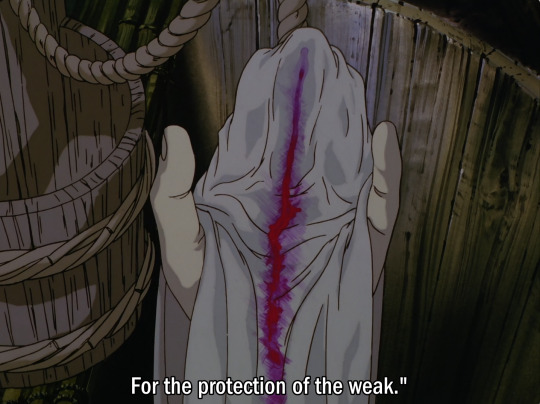
the idealistic hero. there’s a line in the film where kenshin’s mentor is thinking to himself about kenshin’s potential, and he thinks, (not verbatim, just what i remember) “he is pure. and because he is pure, he will continue to improve, as he is driven by the desire to become strong, to the point where i would consider him a simpleton.” and later, kenshin quarrels with his master about the morality of ignoring conflict and the suffering of the masses, when the principles that come with his strength dictate the a responsibility to protect the weak. i often find myself identifying with characters like this — characters who are idealistic and naive, who desperately believe in abstract justice, without any knowledge of the many gray areas in human morality and behavior, who ultimately wish to use their strength for the benefit of the anonymous “people.” i mean, pragmatically, it’s a ridiculous notion. how can one person decide what justice is for those he has the power to kill? who is he really protecting by doing so? and tomoe does a good job of pointing out the hypocrisy in his actions.
a bit on tomoe — she is a really interesting character to me. i’ve always had a fascination with the “tragic cold beauty” type that develops a warmer side to her, but for whom this warmer side is the cause of her tragedy. there are some quiet, subtle scenes where she looks at reflections of herself, which belie the undertow of her being at war with herself in those moments, where her intentions and desires are confused. she’s a powerful character, her power stemming from her contradiction. their relationship is built up over spare, poetic moments that belie a subtle, but intertwining chemistry, that is delicate and poignant as it is framed by the political instability and widespread turmoil of the times. she recognizes kenshin to be a child in his naivety regarding his ideals. her sorrow over the crops that die in the rain is just as palpable as kenshin’s despair over the antithetical nature of his killing. though her taking on the role of being a “sheathe” for the “brandished sword” of kenshin’s rage and anguish is founded on sexist expectations (that are still common today), she is not depicted as a weaker character by any means. different, and subordinate; but just as necessary, valuable and significant as kenshin, though ultimately she dies as a lesson to him- she serves her purpose beautifully, and then is burned away. they are brought together by death and lost love, and as the iris flower dies without the rain, and only her memory is left after the fighting dies down. she is a character trope that isn’t meant to live, as things that are too beautiful always wither away; she is meant to remain a memory, a reminder, a metaphorical and literal scar.

back to the idealistic hero. i think what attracts me so much to kenshin’s character in particular is the same as what makes tomoe fall in love with him: the so, so incredibly gentle nature of his spirit lying beneath his intense desire to do good in the world. a scene where kenshin and tomoe are together in the house they’ve escaped to, eating the vegetables they planted and harvested together, and tomoe mentions that kenshin’s everday could have been like this, if different things had happened in his life. the contrast between the peaceful life full of small happinesses that he could have had, and the brutal, violent, soul-crushing life he leads then — and the yearning i feel for the life he didn’t have, was very real. his “justice that seems like insanity” is haunting and beautiful, but i also want him to be happy. but his “justice” is detrimental to the gentle, kind person he truly is and wants to be. the idealistic hero can’t exist in the real world the way he thought he could; his shedding of naivety and realization than his only real strength is in protecting the people he cares about is sobering. ideals are abstract, but we live in a constantly shifting, unpredictable world that constantly changes like rippling water, and if we wish to live any semblance of a fulfilling life, we have to learn to not be a stone, which is eroded; but to flow along, carving out a space for ourselves within the tide.
these ideas are explored similarly in the manga series “Azumi,” wherein ax extremely strong, quick, genius assassin is a cheerful and loving girl at heart, who forms quick connections with people and only wants to be kind and have true friends. in this manga there is a theme of comparing her to a bodhisattva — a theme that i think is implied in the rurouni kenshin OVA as well. a bodhisattva is a figure from mahayana buddhism, a religion popular in east asia for a period of time (sorry i haven’t taken art history in a while!!), that has reached enlightenment but delays transcendence out of compassion to save other suffering beings. azumi and kenshin share the characteristic of being extremely powerful assassins, to the point of being like gods of war, or gods of death, who, because they are enlightened in their arts of fighting, cannot be allowed to form lasting connections with people they care about. anything they do form a connection with is killed and taken away from them, keeping them on the path of deified violence that they don’t really want (until, for kenshin at least, the war dies down and he swears to never kill again. i haven’t finished azumi so i don’t know what happens). (if any of this inaccurate please lmk, i’m not that knowledgeable about buddhism;;;)
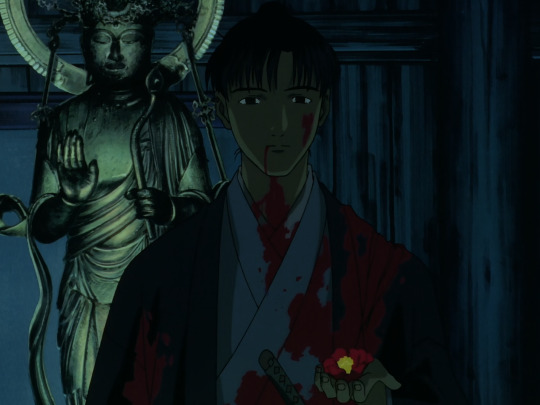
inuyasha and kikyo. inuyasha was a big part of my adolescence, and i think one of the series that really got me into anime in the first place. it’s not a great series honestly, in terms of artistic merit, but it’s plenty fun and full of surprises despite all its shortcomings. but i remember really liking the story of inuyasha and kikyo, and i see kenshin and tomoe’s story being compared to this in other places on the internet as well. the similarities are certainly there — the cold, long black haired conventional beauty meets violent demon, together they learn to be human and to love, which ultimately causes their downfall and the false betrayal and tragedy of the love that never was, which makes it all the more romantic.
the intense appeal of romantic tragedy — i want so desperately for them to be able to continue their lives happily together, yet at the same time i know that that would make for a bland ending (or maybe not. but,). the moment that breaks me isn’t the climactic moment of tomoe’s death, but the way that her spirit still comforts kenshin as he finishes the job started during the war, and carries his will to never kill again once it is over. the tragedy is what makes the love story so good; it wouldn’t be half as appealing without it, but it’s also what makes it painful. pain and sweetness, together, suffering and love, to feel pain is to feel love and that’s how you know, this is a theme in my life too though in different ways. maybe i just savor the feeling of being heartbroken, but not for myself. i want to feel tragic. i want to be saved. no one can save me in real life, but at least i can dream, project onto this immaculate story. there’s something really feminine about tragedy, for me. (i don’t consider myself a femme, necessarily, but if i had to choose i would lean femme, i think femininity of any kind is a thing to be treasured.) it’s something i felt when i was in the throes of identifying with mitski — she’s such a tragic character, branded in such earnest, genuine sadness and controlled despair. to hold the sorrow without the visceral pain, and peek into a feeling that’s meant to be desired. do i wax poetic? i can’t help it. i’m a romantic, through and through.

also, just another thing. i think another thing that makes the whole deal extra sweet for me is the effeminate appearance and nature of kenshin, haha. it’s certainly not trying to be ~queer~ or anything but it’s one of those things that, i feel like, resonate somewhere innately for those of us who seek out representations of people outside the cis/het norm. i’ve heard that fans of yuri tend to enjoy this series lol.
i honestly can’t think of anything this OVA could have done better. i think there might have been something but i can’t remember it anymore. if you have any thoughts, feel free to reach out~
10 notes
·
View notes
Text
TD Theme: Walker Hordes
So, I talked about Winslow yesterday. Today I want to talk about walker hordes and the motif we’ve often seen of walker hands pounding against windows or structures. I've always thought that it had something to do with Beth, but he could never say exactly what. We see it around a lot of characters, so I didn't know exactly what it would have to do with her. It’s becoming more clear to me now.
***I’m going to mention some spoilers from 4x08 of FTWD below. So if you aren’t caught up and don’t want to be spoiled, don’t read that section. I’ll warn you again beforehand.***
We’ve seen lots of instances where the group is surrounded by big herds of walkers. Often, characters die. But I also think it’s a theme where sometimes characters SEEM like they'll die, but they don't.

For little bit of history, we can actually trace this back S1. In 1x01, Rick was almost overwhelmed by the walker horde in Atlanta but managed to get up into the tank, and then Glenn saved him.
We also saw a herd on the highway in 2x01, when everyone hid under the cars. In that case, no one died directly, but Andrea came close, and right after that, Sophia ran and ultimately disappeared. I think that's important because I think Gimple took that it built on it for future arcs.

We believe TF ran into a huge horde during the missing time after Coda, right? We’ve always thought that horde was why Beth got left behind. (More details HERE.) So we had a huge walker horde that led to Beth's disappearance, but more importantly, it led to TF believing she's dead. Of course, we believe she's not and she’ll be back. Because of the linked post above, we have pretty good evidence that a horde of walkers filmed for Coda.
What was the next major death fake out death after that? Glenn, in 6x03. What happened to Glenn? He was overrun by a horde of walkers. We, the audience, saw him go down and be overwhelmed by them, and were meant to believe he was dead. In that case, he pulled himself under the dumpster and survived.

***Here are the spoilers for Fear. If you don’t want to read them, skip the next paragraph.***
Recently, we had the same thing with Madison in Fear. Madison was surrounded by horde of walkers and we are meant to believe she was killed by them. But once again, we didn't see a body, we didn't see her be bitten or eaten in any way. So y'all know, as I said in THIS post, I don't buy that she's dead. I think she's alive and will be back. And once again, we have the death fake out of a major character, precipitated by a walker horde.

***End of spoilers***
And now, I think Rick will go the same way. Because of the symbolism in 7x12 (X) and 7x10 with Winslow (X), I think Rick will be overwhelmed by horde of walkers, much like Glenn was, much like Beth probably was in some way, and much like Madison apparently was. And like all of them, I think he will survive it. Like Beth, I don't think we’ll see him again for several seasons. The general audience will believe he's gone for three or four seasons before he actually returns.
Can you see the pattern with these hordes?
I also wanted to throw in this. I did THIS POST a couple of years ago, because I saw a pattern. I thought it was different than the walker hands, but now I think it's all part of the same thing. In Consumed, when Daryl and Carol were on the bridge and ended up getting trapped in the van, a walker horde attacked them, and we saw someone (a walker) lying on the ground.

I connected that to a strange sequence in Inmates, where Maggie, Sasha, and Bob are looking for Glenn in the bus. We saw a blond walker fall onto her side. I'm still not exactly sure what these things are supposed to be showing, but I'm convinced that they’re connected to Beth in some way. And I'm really thinking now they’re indicative of how she survived, somehow. That maybe she somehow laid down under the walker horde, much like Glenn did, and survived.

Also, in Inmates, Maggie was looking for Glenn, the love of her life and later found and reunited with him. In Consumed, Daryl was looking for Beth, also the love of his life, and we still haven't gotten that reunion yet. I've shown HERE how everything that happened with Glenn in Inmates foreshadowed Beth’s arc. It’s interesting to see them connected in this way.
We also see the walker hands often banging on windows, glass, or other structures such as the tank in S1 and S4, or the trailer Father Gabriel and Negan got trapped in during S8.

I think all this is part of the same theme. It represents the characters being in real danger of dying, but finding some way to escape. Back in S2, the entire group, especially Andrea, were very real danger of dying, but they managed to survive. The same will be true of Beth, the same is true Glenn.
We saw a lot of walker hands on windows in S6, when the walker horde overwhelmed Alexandria. Here’s a picture of the hands beating on glass.

Once again, the entire group was in real danger of being overwhelmed, but by smarts and grit, they managed to survive.
I went back and watched this part in 6x11 where TF went in to get/save Jesus’s friends after they crashed their car. I remembered it because there were posters of walker hands on the walls, and lots of the characters peering into murky darkness.

Even back when it aired, we saw the Beth symbolism in this sequence (details HERE) but watching it now, things are really jumping out at me in an interesting way.
Check this out, guys. It’s kinda awesome. So when they go in, Rick and Michonne find the first two Hilltoppers: a black woman (I think it’s Bertie) and a white man. I only mention their races because Rick and Michonne have a similar dynamic. While I don’t think these two Hilltoppers are supposed to be a couple, I do think they represent Michonne and Rick. Rick asks, “There more of you?” and the woman replies, “Two more. They ran ahead.”
When I heard that, I immediately thought of how many death fake outs there have been. In regular TWD (excluding Fear here) there have been 3 major death fake outs. I don’t include mini ones (like Rick in 7x12) or close calls where someone almost gets bitten and then doesn’t. I’m talking about big ones where we go anywhere from several episodes (Glenn) to several seasons (Beth) before they reveal the character to actually be alive.
So officially, we’ve only had two thus far (Beth and Glenn) but I think Rick will be the third. At this point, in S6, Glenn was still alive. I believe this dialogue referred to there being two more major death fake outs in the show.
I remember when this first aired, trying so hard to figure out what this symbolism meant. Remember there’s an overturned car when they get there, and then they go into a dark building. It felt like a metaphor for Beth being left in a car, and then her story line becoming murky
This first group of two represent Michonne and Rick, one of whom will have a death fake out later on. The next group was two white guys who, no, weren’t romantically involved either. But one of them was the DOCTOR, which I think could represent Beth/Grady and other one was a man who’d lost his wife sometime back and nearly died here because Abraham mistook him for a walker.

Daryl lost Beth and nearly died, both physically and emotionally, many times since then. So this guy really screams Daryl. In fact, he’s the one who, once they all get out to the RV, Jesus asks if he’s all right and he starts babbling about seeing his dead wife standing before him. We all pounced on that because it sounds like such a heavy resurrection reference.

You could even argue that, when they broke up into groups (Rick/Michonne and Daryl/Glenn) it represents Glenn’s real death in many ways, which Daryl was a big part of.
So, this is a very broad and general theme about being besieged by the dead, but finding some way to survive. It's something that's been present since the very beginning the show.
It’s interesting that Glenn saved Rick from this situation in 1x01, and then later had his own fake death by walker horde. Now Rick, in S9, will probably have one as well.

Anyway, I’ll keep an eye on this as S9 gets into full swing, but I've been thinking about these parallels a lot lately. It’s always great when we can start to combine themes and understand what they mean and why they're there.
In other seasons, we didn't know what Winslow represented. We didn’t know why Rick and Michonne talked about possibly losing one another (in 7x12). Now it's all coming together in a way that, even if were not too happy about AL leaving, is more clear and understandable.
I would love to hear some thoughts on all this!
#beth greene#beth greene lives#beth is alive#beth is coming#td theory#td theories#team delusional#team defiance#beth is almost here#bethyl
7 notes
·
View notes